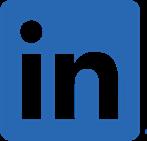

Impact in Action


30 Years of Amplified Giving
As we celebrate Greater Houston Community Foundation’s 30th anniversary, we remain steadfast in honoring donor intent and serving as a powerful resource and collaborative partner in amplifying giving throughout the philanthropic space. As a community foundation, Greater Houston Community Foundation is relatively young compared to others across the nation. In fact, the first community foundation was established in 1914 in Cleveland by a banker who was inspired to create a “community chest” that would enable generous residents to ensure their philanthropic dollars had a positive impact on the community. Today, according to the Community Foundation Awareness Initiative, over 900 active community foundations across the country represent charitable assets of $112.7 billion.
Early on, the Community Foundation’s focus was on defining our purpose and building trust within the community, capitalizing on the ‘do good’ attitude that Houstonians are known for. The dedication of early Governing Board members helped connect the Community Foundation with Houston’s most philanthropic individuals. Simultaneously, the Community Foundation expanded its expertise to become a trusted ally in helping professional advisors assist their clients with philanthropic planning.
At the Community Foundation, “amplified giving” reflects our ongoing commitment to evolving alongside our donors and for our community. As our donors’ needs have evolved, so have we—offering personalized philanthropic strategies, donor advised funds, scholarships, multigenerational planning, and more. Through it all, we’ve remained steadfast in honoring donor intent, listening closely, and responding with the tools and guidance needed to make giving easy, efficient, and effective.
Today, we’re showing up in bigger, bolder ways—whether through customized advising, tailored programs for fundholders on critical issues, or our ever-growing impact through collaborative grantmaking and strategic partnerships. Together with our donors and partners, we’re building a future fueled by generosity—creating lasting change that will benefit generations to come.
The Beginning
When Randall Meyer became President of the Community Foundation’s Governing Board, he conveyed to the Greater Houston Partnership that a more traditional community foundation, such as those found in many other U.S. cities, would have immense value for Houston.
“With [Houston’s] increasingly complex cultural, educational, health, and social welfare needs, there is a real regional imperative both for expansion of philanthropy and for a more organized way of anticipating and responding to the priority needs in a sensible and balanced fashion. The community foundation concept is, in a very real sense, made to order for Houstonians. The community foundation is just the sort of proactive, dynamic institution for broad good in the community to which so many of us can relate.”
— Randall Meyer, August 22, 1989, A Presentation to the Executive Committee of the Greater Houston Partnership
Milestones of Impact
Each year since the Community Foundation’s inception has been filled with countless acts of amplified giving. Below is a snapshot of truly historic milestones that, in partnership with our donors, have shaped the Community Foundation into what it is today.
2002
1971
The Community Foundation was established under the Greater Houston Chamber of Commerce as a mechanism for Houstonians to enhance their community.
Retooled as a donor advised fund (DAF) provider. The Community Foundation is now the 24th largest community foundation in the country and one of the most DAF-focused community foundations.
2009
1990
The Community Foundation was reconstituted as a public, independent charity.
2001
Steve Maislin hired as President & CEO.
The Community Foundation Council was established as a group of dedicated Houstonians who advocate for the Community Foundation, offering advice and serving as a referral source.
1995
The Community Foundation’s official “birth year.” It began active operations with assets of $3.6 million by year end.
2005
Former President George H.W. Bush initiated an engagement with the Community Foundation related to Hurricane Katrina recovery efforts.
2014
Launched the Advisor Outreach Committee, a council of professional advisors who partner with the Community Foundation to develop tailored philanthropic solutions for their clients.
2023
The Community Foundation and United Way of Greater Houston established the Greater Houston Disaster Alliance to accelerate recovery during disaster. This philanthropic partnership evolved from the organizations’ joint efforts with recovery funds related to COVID-19 and the 2021 Winter Storm.
2015
Established the Center for Family Philanthropy, now a national leader in advising families on multigenerational giving. The Next Gen Donor Institute, established in 2011, equips participants with powerful, strategic philanthropic tools and today has over 165 alumni.
2017
Established the Hurricane Harvey Relief Fund, the Community Foundation’s most significant relief effort to date, which raised $114 million.
2019
Launched Understanding Houston in collaboration with Rice University’s Kinder Institute for Urban Research as a central resource to measure what matters— empowering Houstonians to take informed action.
2024
Completed the inaugural High-Impact Grantmaking cycle, awarding $500,000 to three nonprofits with impactful, ambitious plans to address intergenerational poverty and advance economic mobility in Houston.
2025
Over $1.4 billion in assets under management. With more than $2.7 billion in grants distributed since our inception, our growth has been fueled by the generosity and vision of those we serve.
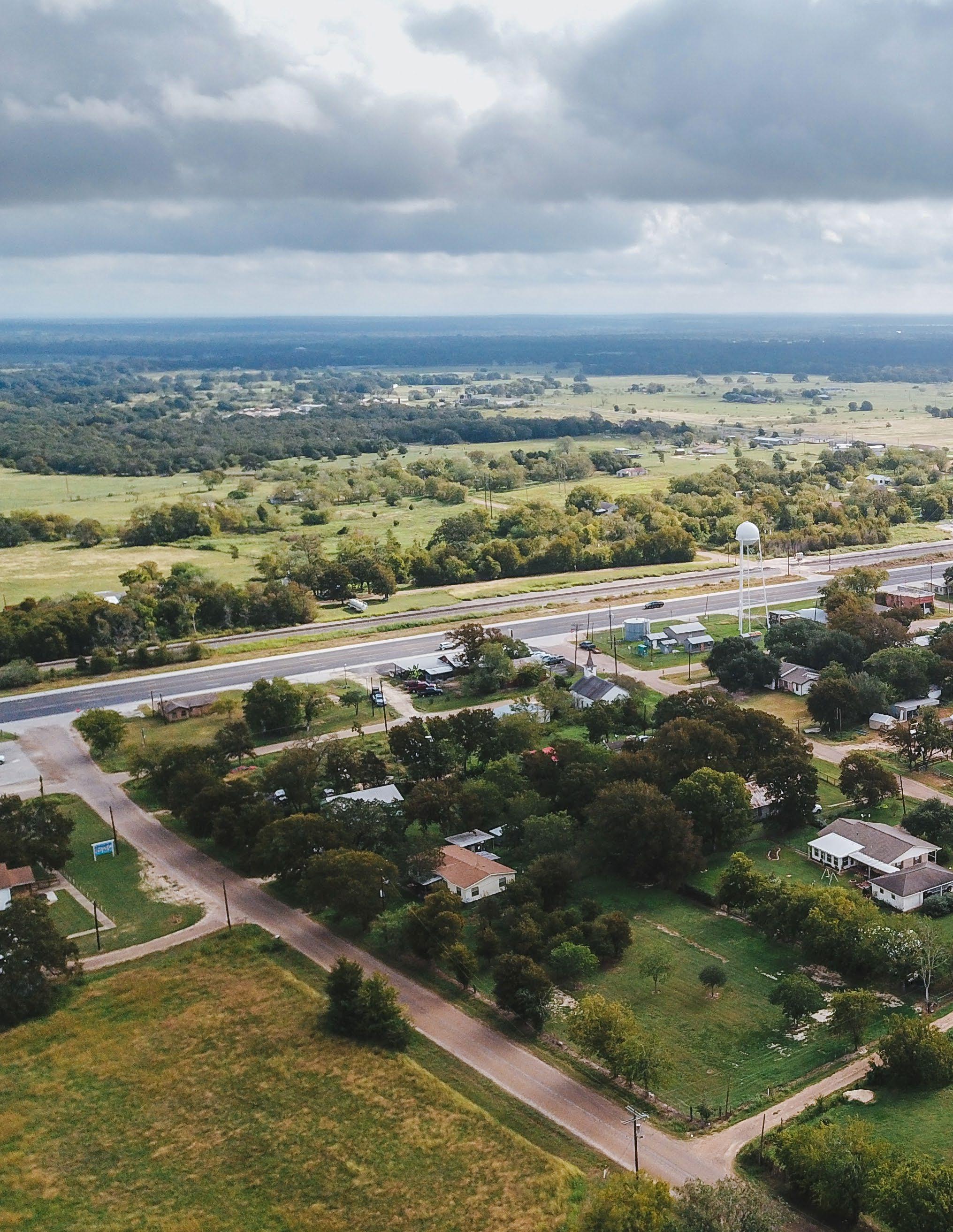
Planning Powerfully
Monica Walker’s Blueprint to Lasting Impact
When Monica Walker was a young girl, her father passed away in a sudden accident in Galveston, Texas. He had jumped into the water to help retrieve a loose stringer of fish for someone and never resurfaced. This tragic event had a profound impact on Monica. Not only was her father no longer with her, but her mother was left to raise Monica and her brothers alone. As the only daughter, Monica was inspired by her mother’s strength—and from a young age, she was determined to build a future where she could confidently support herself.
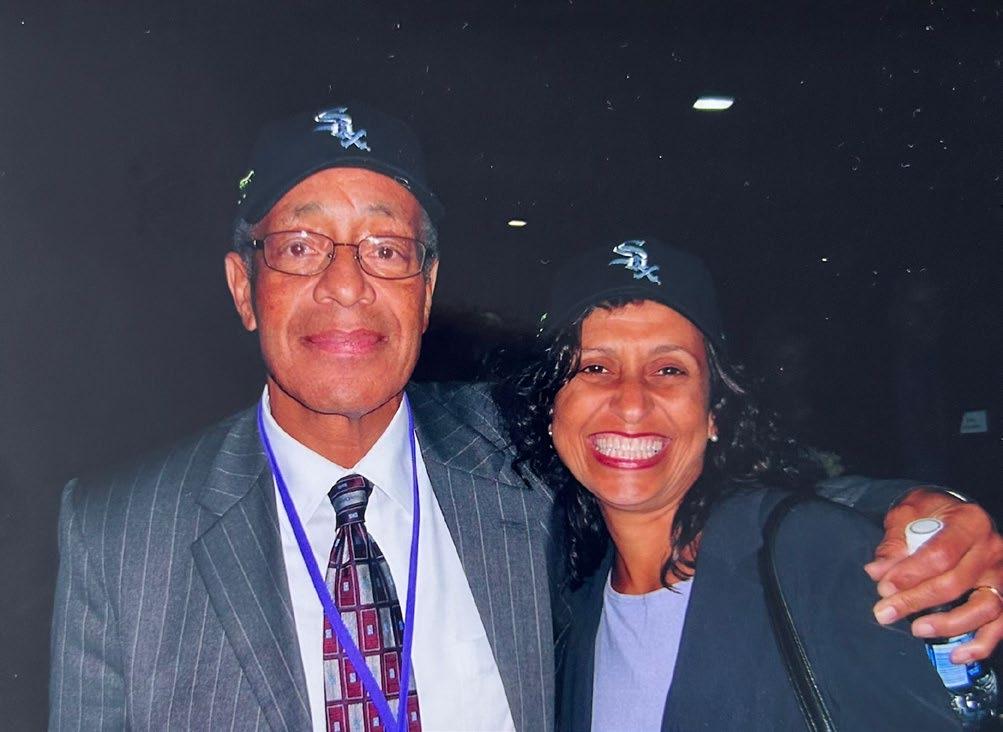
Planting Seeds of Character
Monica was born and raised in Acres Homes, once considered the South’s largest unincorporated African American community, located approximately ten miles northwest of downtown Houston. When Monica was growing up during the 1960s in Acres Homes, land was often divided by acres, not by plots, hence the name “Acres Homes.” With the extra space, many families had small gardens or raised farm animals. Monica recalled, “Although we were not far from downtown, it wasn’t unique to see horses, cows, or chickens being raised in the area. It was ‘rurban’ in that Acres Homes was urban and within Houston city limits, but rural at the same time.”
Monica looks back on her childhood fondly, but acknowledges the importance of growing and evolving in response to her environment. Monica explained, “I went to a segregated elementary and junior high school. When I got to high school, my two younger brothers and I attended an integrated school. I think my educational experiences were points in my life that brought about different aspects of growth.”
In her early elementary years, Monica was part of the inaugural Head Start program, an educational initiative launched in 1965 to break the cycle of poverty. The program provided children from low-income families with holistic support addressing their emotional, social, health, nutritional, and educational needs. This early foundation, coupled with the influence of a devoted aunt who was an educator and guiding force in Monica’s academic journey, helped instill a deep belief that education is the gateway to opportunity. Reflecting on her upbringing, Monica shared, “My mother did not have a degree, but she often expressed the importance of a college education for my brothers and me, particularly in the era in which we grew up.”
Although Monica has lived in Chicago since she was 32 years old, she takes great pride in sharing that she was born and raised in Houston. “When I look at my life, the values that have become a part of who I am were, in many instances, developed through my upbringing.” Monica shared how her mother was a faith-filled person who instilled in Monica and her brothers the importance of faith and family.
From Humble Beginnings to High Achievements
In 1991, Monica began a money management firm in Chicago, in partnership with Lou Holland, called Holland Capital Management. The firm became one of the largest minority- and women-owned asset management firms in the country. Monica and Lou had similar upbringings, often joking about how Lou was a “farm boy” from Wisconsin and Monica a “cowgirl” from Texas.
In 2016, Lou Holland passed away, and Monica was eager to do something in his memory. She helped to establish the Lou Holland Scholarship Fund at Chicago Community Trust, the third-oldest community foundation in the United States, which provides financial assistance to minority students from Chicago pursuing degrees in areas that lead to careers in the financial services industry. This scholarship fund aims to help address the lack of diversity that has often been evident within the industry.
Monica and Lou both knew the importance of having strong financial competence. Monica shared, “Lou was an excellent example for me. He emphasized the importance of financial literacy and of positioning young kids to understand financial literacy and why it is important.” Lou helped shape Monica’s view on giving back. She shared, “Lou taught me that since education was one of the things that allowed me to have a meaningful and productive life, I should use my resources to help others accomplish the same thing.” She even acknowledged to how Lou insisted on integrating educational and community support into the firm’s business model.
With Lou’s passing and her subsequent retirement, it sparked a desire in Monica to consider how she might leave a lasting impact in both Chicago—the city where she had built her firm and established her adult life—and the place that shaped her values and identity, Houston. She reflected, “It got me thinking, what happens when I am no longer here? I don’t have children of my own, and I wanted to establish a fund in Chicago and Houston that can be used to provide education and other resources to women and children.”
Lou Holland and Monica Walker at the After School Matters event, U.S. Cellular Field, September 13, 2006
Crafting Her Legacy in Houston
In late 2020, Monica reached out to Greater Houston Community Foundation to establish the Monica Walker Equity Fund. The overall goal of this fund is to provide educational programs and other support services for women and children residing in historically Black and/or low-income communities in Houston, including but not limited to Acres Homes, Sunnyside, and Fifth Ward. Monica stated, “The goal of the Monica Walker Equity Fund is broad, but I preferred to target the funds to underserved, economically disadvantaged areas in Houston that have historically lacked access to resources and opportunities.”
Monica acknowledges that communities change, but that was one of the catalysts for why she partnered with the Community Foundation. “An organization like Greater Houston Community Foundation—with its infrastructure, deep knowledge, and resources—is best suited to execute my legacy. I trust the Community Foundation to understand my intentions and ensure what I care about is honored, even when I am no longer here. I have full confidence in its ability to take what we’ve discussed and either implement it as planned or make thoughtful decisions to adapt the funds in a way that continues to reflect my values as future needs arise.”
Planning your legacy can be challenging. It forces you to think long-term, confront your mortality, and make decisions that do not play out during your lifetime. Although these conversations often do not feel urgent, having them now can lead to the most meaningful outcomes and impact. Monica noted, “People are more willing to give when it is something they believe in or something they have experienced personally. This reflection can help people understand how they can make a difference.”
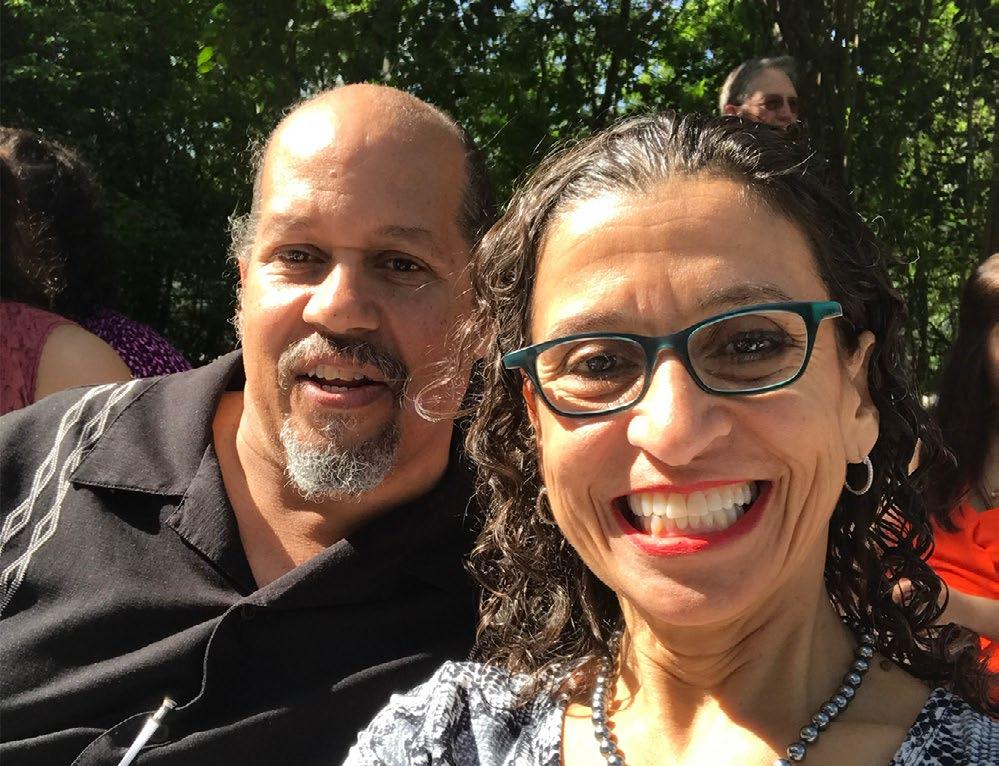
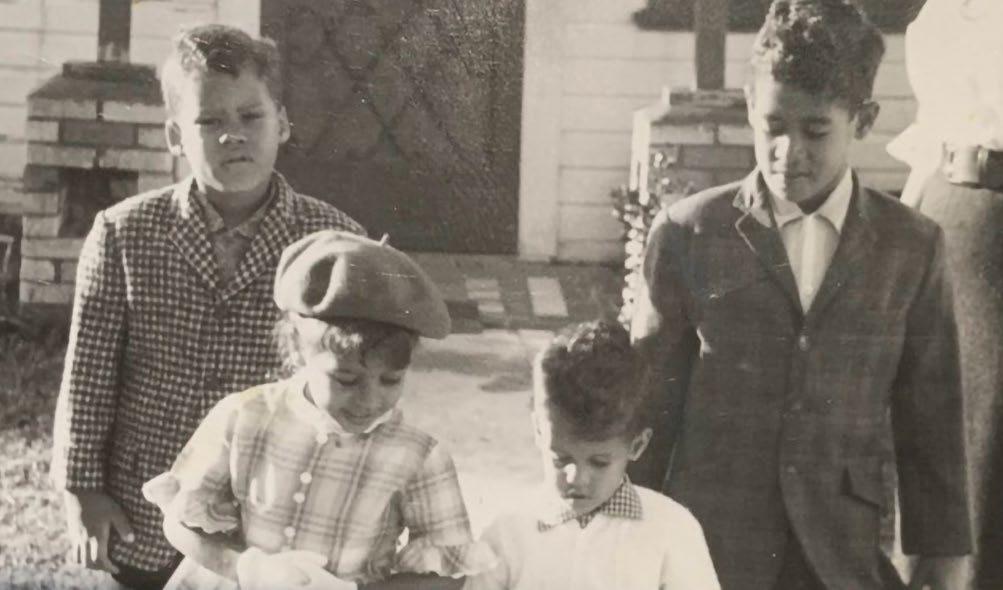
Honoring Family
In 2023, Monica reached out to the Community Foundation once again to establish the Timothy and Julius Walker Education Fund, in memory of her brother, Timothy, and stepfather, Julius. Monica shared, “Timothy was the baby of our family and was great at fixing things, but never had a desire to attend a four-year college, so he went to trade school to get his HVAC certification.” After battling a terminal illness, Timothy expressed to his sister how he wanted to help others from Acres Homes or other disadvantaged areas in Houston receive their certifications outside of a four-year college.
To honor Timothy’s wishes of providing alternative pathways to viable careers, Monica shared that the Community Foundation was the perfect partner to establish a donor advised fund with this focus. “The comfort of partnering with an organization that is watching, learning, understanding, and bringing new ideas, information, and solutions is very important.” She shared that setting up both her endowed fund and donor advised fund with the Community Foundation was a smooth process. After just a few conversations with her philanthropic advisor, they were able to clearly define the purpose of each fund.
Living True to Her Values
When Monica reflects on the success she had in her adult life—faith, family, and education—all have had a significant impact on who she is today. Monica shared, “Faith and family are deeply personal, so when I think about helping others that may be facing challenges similar to those I faced growing up, or who are simply striving to build a meaningful and successful life, I strongly believe in the power of education. Whether it’s a college degree or a professional certification, education opens doors. It gives people the chance to dream bigger, go further, and create lasting change for themselves and their communities.”
Monica and Timothy (front) with siblings outside their childhood home in Acres Homes
Monica with her brother, Timothy Walker
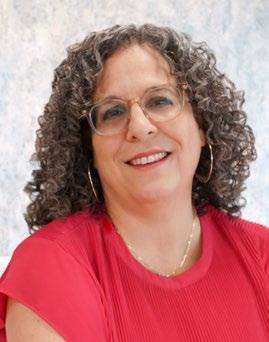
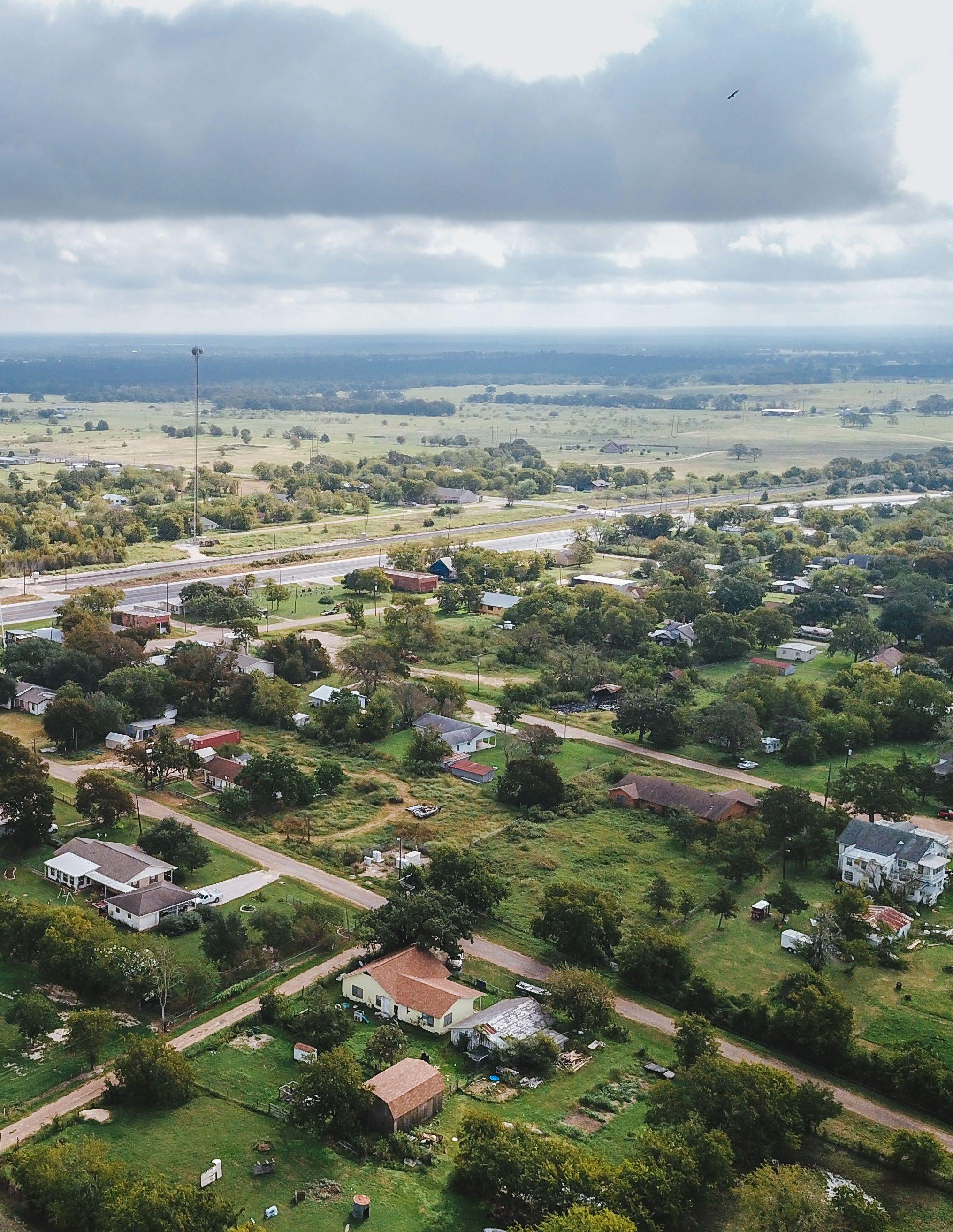
Jennifer Touchet Vice President of Personal & Family Philanthropy
Adobe Stock / Christian Hinkle
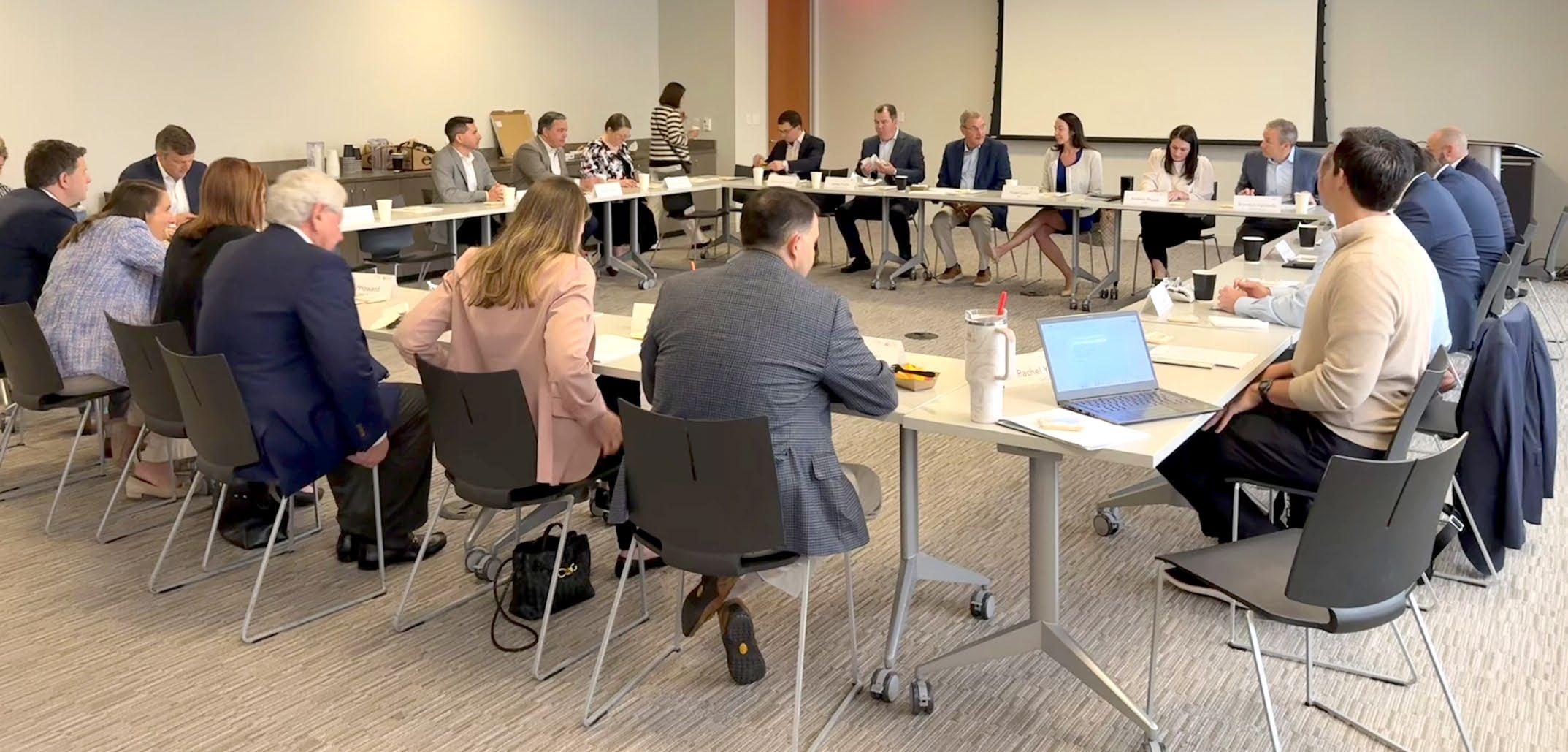
Amplifying Philanthropic Impact Together
Professional Advisor Council Unveiled
We’re proud to announce the launch of Greater Houston Community Foundation’s Professional Advisor Council—an important step in deepening our partnership with the credible advisors who guide our community’s most generous individuals and families. This initiative reflects our shared commitment to meaningful and lasting philanthropy, as well as supporting advisors in helping clients align their wealth with their values.
The Professional Advisor Council (PAC) is a strategic partnership that connects trusted professional advisors—financial planners, attorneys, wealth managers, and others—closer to the heart of our community’s needs and opportunities for giving. Through this effort, we aim to equip advisors with tools, insights, and strategies to help their clients give with purpose and confidence.
Welcome, New PAC Members!
Our excitement for the PAC stems from our belief in the transformative power of collaboration—when advisors and the Community Foundation work together, we can unlock greater philanthropic potential and drive lasting, positive change for the causes that matter most. Karen Costa, Chair of the Community Foundation’s Advisor Outreach Committee stated, “We are incredibly grateful to have this distinguished group as part of the inaugural cohort. Their combined 400 years of experience is an indication of
the wealth of knowledge and expertise they bring to the Community Foundation. We are excited to leverage their shared experience to understand how we enhance the Community Foundation’s presence in the advisor community and with our clients.” Together, the PAC can help more individuals and families make a lasting difference.
Professional Advisor Council
Join us in welcoming the members of the inaugural cohort.
Wesley Bowers Fizer Beck
Jason Danziger Corient
Anthony Gamez BDO USA
Amanda Gyeszly Gyeszly + Prangner
Kelly Hackett Tectonic Advisors
Brandon Henry Mosaic
Jolie Howard Ytterberg Deery Knull LLP
Richard LaFont Endeavor Advisors
Brian Merrill Tanglewood Total Wealth Management
Andy Moore PricewaterhouseCoopers LLP
James Pavlik Icon Wealth Partners
Emily Smikal Withum
Ryan Staff RSM US LLP
Matthew Summers Brown Brothers Harriman
Carol Warley RSM US LLP
Thomas Wright
Thomas M. Wright Advisory LLC
Scott Zindler
Morgan Stanley
Empowering Advisors to Integrate Charitable Giving
The core purpose of the PAC is to support advisors in seamlessly integrating charitable planning into their everyday practices. Karen Costa, also shared, “The members of PAC will gain deep insight and knowledge of the Community Foundation while also enhancing their professional development with respect to philanthropy. Last but certainly not least, they will have an opportunity for peer networking and relationship building with other advisors in the greater Houston community.” We understand the vital role advisors play in shaping their clients’ financial journeys, and we’re here to elevate that work by making charitable planning a natural and effective part of it.
Through the PAC, advisors gain access to a network for knowledge sharing, professional growth, and collaborative dialogue. This partnership will enable advisors to stay informed about emerging issues, innovative trends in philanthropy, and new pathways for impactful charitable giving.
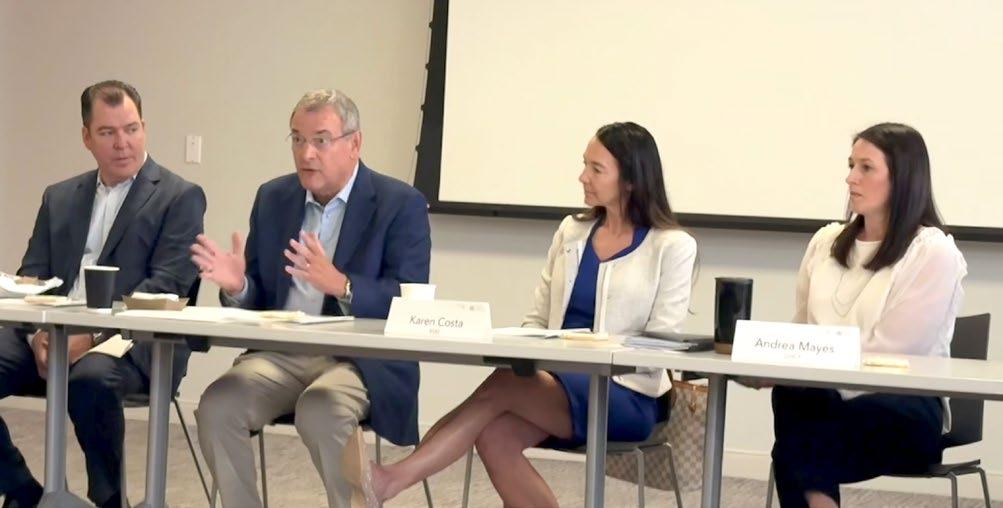
Your Philanthropic Partner
Building a Community of Philanthropic Professionals
The PAC isn’t just about professional growth—it’s about building a network of philanthropic professionals committed to creating change. Karen Costa commented, “I’m reminded of the saying, ‘If you want to go fast, go alone; if you want to go far, go together.’ The PAC helps to bring more advisors deeper into the Community Foundation’s ecosystem. This collaboration and expanded reach into the advisor community is necessary for long-term sustainable success.” The PAC is a space for exchanging ideas, exploring innovative planning approaches, and forming meaningful relationships that extend beyond individual client engagements.
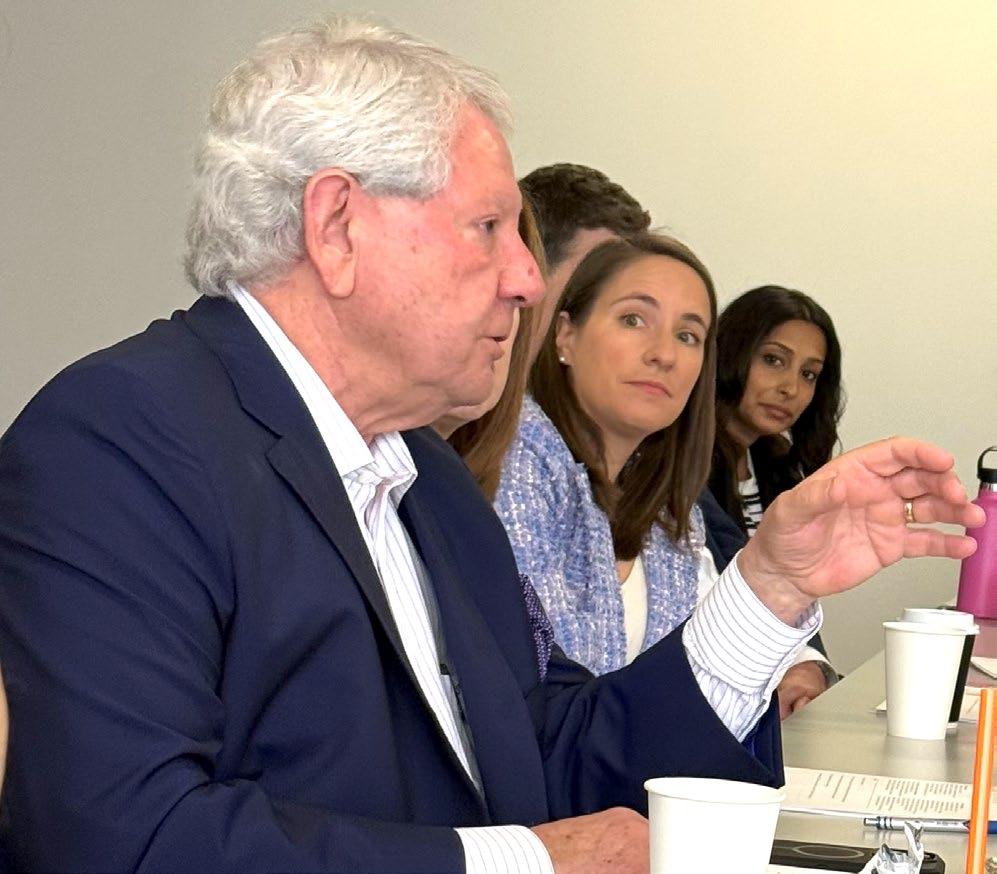
At the Community Foundation, we’re here to be your philanthropic resource, offering guidance, tools, and a trusted platform to support your clients’ goals. For donors contributing $500,000 or more to a donor advised fund, the Community Foundation offers a preferred third-party investment advisor option, so you can ensure your clients giving aligns seamlessly with their financial goals. Whether helping structure a noncash gift, identifying local impact opportunities, or navigating family legacy conversations, we are your partner in creating charitable solutions that matter.
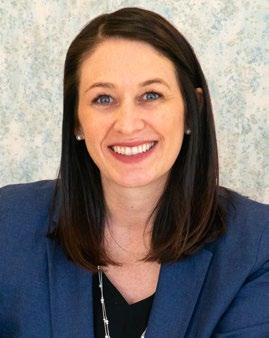
Ready to elevate the way you support your clients?
Andrea Mayes Senior Director of Charitable Solutions
L-R: James Pavlik, Bob Harvey, Karen Costa, and Andrea Mayes
Tommy Wright, Community Foundation Board Member and PAC Member

You’re a strategic thinker. Apply that to your giving.
A donor advised fund with Greater Houston Community Foundation helps you turn your generosity into lasting impact—with flexibility, tax benefits, and a deeper connection to the community you love.


Steering a Legacy
Nora Annunziato’s Path to Shaping Her Family’s Generosity
When Nora Annunziato’s father-in-law, Tony Annunziato, approached her and her husband, Brett, inviting them to take a more active role in the Annunziato Family Foundation (Family Foundation), they felt honored—and a bit humbled. It was a thrilling opportunity to make a meaningful impact through philanthropy, but they also recognized the profound responsibility that comes with stewarding family resources.
“We knew we had been given a fortunate position. Brett and I were really excited, but we wanted to ensure that if we are in a position to give away this amount of money, we do it the right way— strategically and with impact.”
— Nora Annunziato
Charting the Course Ahead
To shape their next steps, Nora and Brett turned to their professional advisor, who introduced them to the Next Gen Donor Institute (Institute) at Greater Houston Community Foundation. The Community Foundation’s Institute is a year-long program, where donors can develop a deeper understanding of their philanthropic identity and learn from peers and community leaders about philanthropic trends and possibilities. For them, Nora describes the Institute as “fun, easy, simple, and nothing was over-complicated.” Nora and Brett had the opportunity to engage with other participants in a supportive and private community, leaving the program with new tools, resources, and a network to help shape their giving and community leadership. She continued, “I was really appreciative that we were able to go through the grantmaking process with other Institute participants through the Next Gen Giving Circle—it was great preparation for eventually leading our family’s giving.”
The annual Next Gen Giving Circle is a forum for alumni of the Institute, where members collectively focus on one area of need, solicit and examine grant applications, perform site visits, and ultimately select one or more organizations to support as a group. Through participating in the Next Gen Giving Circle, Nora learned how to evaluate nonprofits through a formal grant application. She took these skills back to the Family Foundation’s Grants Committee and was better able to facilitate discussions around different organizations they considered supporting.
Nora and Brett are both native Houstonians living in Chicago and enrolled in the virtual version of the Institute amid the pandemic. “I had not been heavily involved in charitable giving before,” Nora noted. “I’d volunteered with causes I loved, but this was the first time I was thinking about shaping a philanthropic strategy—how to make smart, impactful gifts, and ensure our grants aligned with our family’s mission.”
What she discovered went beyond strategic giving. The experience helped Nora realize how thoughtful and deliberate one needs to be if they really want to ignite impact. Nora shared, “I loved learning about the due diligence process, which is one of the most important steps, and seeing how it helped the Family Foundation choose the best organizations to support.”
Tony created the Annunziato Family Foundation with the intention of involving the next generation. Tony explained, “I started the Family Foundation to give back to those less fortunate than I had been. But also, so that I would set an example for my children to follow if they chose to be involved.” Initially, Nora shared that Tony was really steering his family’s charitable efforts, but as he started to think about passing his values to the next generation, he wanted his children, nieces, and nephews to become more involved. Nora noted, “Tony is a big believer in giving back to the communities we live in. He established the Family Foundation so we could all participate and make a difference within our communities and for causes we are passionate about.”
Jennifer Touchet, Vice President of Personal and Family Philanthropy at the Community Foundation, often encourages families to begin preparing the next generation early.
“It’s critical that wealth inheritors are not only educated financially, but also rooted in values,” Jennifer explains. “With the right support, young philanthropists like Nora and Brett are able to carry those legacies forward with clarity and confidence.”
Nora spoke about how participating in charitable giving has been a surprisingly meaningful way to stay connected with Brett’s extended family, even though everyone is scattered throughout the country. Nora admitted, “Having a reason to connect during a season of life where we are all busy with careers and family has been a real silver lining. It’s also allowing me to get to know some of the cousins on a deeper level as I learn more about the causes and issues that matter most to them.”
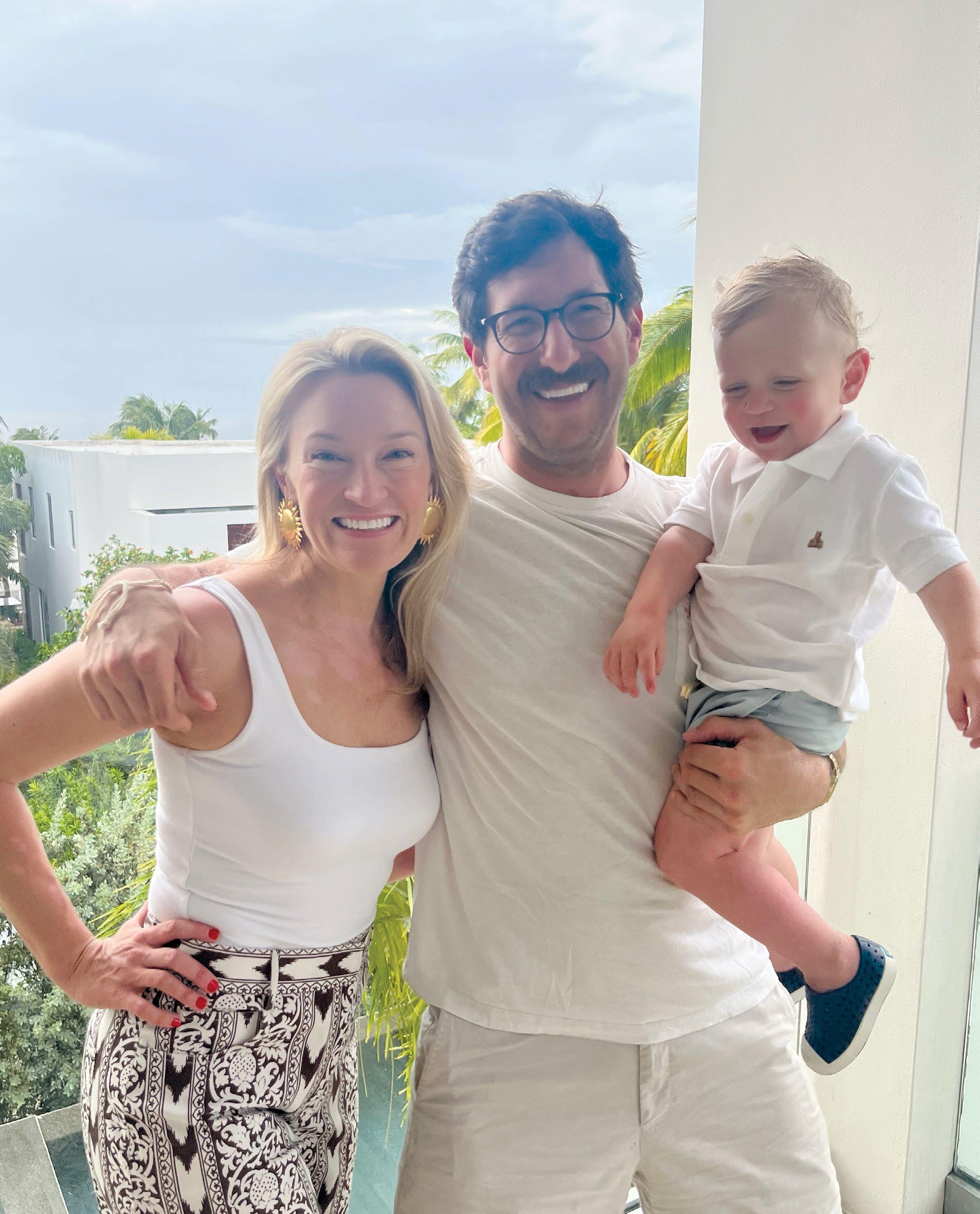
L-R: Nora, Brett, and George Annunziato
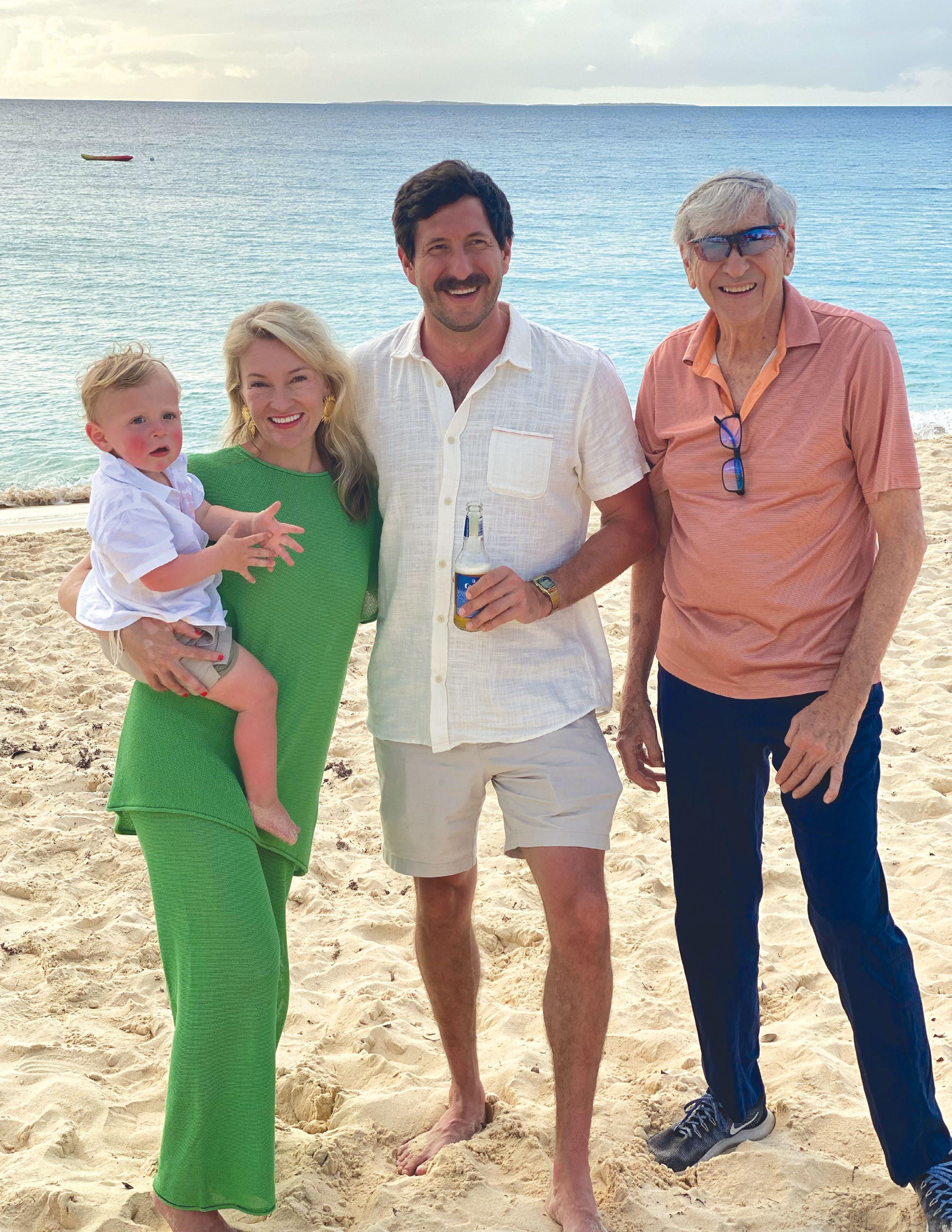
L-R: George, Nora, Brett, and Tony Annunziato
Fresh Ideas, Rooted in Family
Nora’s passion for giving back became evident to her family, eventually leading her to assume the role as President of the Annunziato Family Foundation. Tony noted, “Nora has indeed stepped up in a leadership role not just for my children but for all my relatives. If there is to be generational success in philanthropy it seems to be led by the women in the family.” Nora confessed, “There was a lot of work involved in making grants while we were operating as a Family Foundation, and we wanted to find a way to get more family involved in our giving. A lot of them were balancing careers and family life and were worried about the time commitment to the Family Foundation each year.”
This desire to have more family involved led to a strategic philanthropic change under Nora’s leadership. In 2024, the Annunziato Family Foundation shifted into a donor advised fund (DAF), the Annunziato Family Fund (Family Fund), with services at Greater Houston Community Foundation. Nora explained, “By switching over to a DAF, it made the grant-giving process so much easier, we can now give to a wider variety of organizations, and it requires much less time out of our busy day-to-day lives.” Tony, added, “We closed the Family Foundation and moved the assets to a DAF because it is more time and tax efficient, allowing us more time to focus on learning how to give.”
Today, more family members are involved with the Annunziato Family Fund as the commitment is more streamlined. Additionally, the Family Fund can support more family members’ interests and causes they are passionate about. Currently, if a member of the family is involved with an organization and recommends a grant, the Grant Committee can approve the recommendation and support of the organization.
So, what does a DAF with services look like? For this Family Fund, the Community Foundation provides philanthropic advising to Nora as she is the chairperson of the Family Fund. The Community Foundation helps her plan committee meetings and to continually improve the grantmaking process for her family. Additionally, the Community Foundation helps to facilitate the Family Fund’s Finance Committee meetings in partnership with their third-party

“I started the Family Foundation to give back to those less fortunate than I had been. But also, so that I would set an example for my children to follow if they chose to be involved.”
— Tony Annunziato
financial advisors and Grants Committee. Essentially, the Community Foundation tracks the Family Fund’s official business, so Nora and her family can focus on their impact.
As needed, the Community Foundation is available to provide strategic input about how to have an impact and how to best evaluate nonprofit organizations. Nora explained, “The Community Foundation is guiding us through our first year of operating as a donor advised fund. We love our team at the Community Foundation as they are always available when we have questions, need help, or want to throw out ideas. I value the team and what they’ve helped our family accomplish over the years.”
The Community Foundation’s Center for Family Philanthropy exists to help families with the support they need to bring families together while enriching the communities they care about. All families are unique, and the Community Foundation is here to help families ensure their charitable efforts are the most impactful and efficient they can be.
Living the Legacy of Giving
For Nora, her commitment is clear: continue to deepen her understanding of different causes, stay grounded in purpose, and help carry on Tony’s legacy of giving for many generations to come. Nora closed with, “When you are working with family, you must be open and flexible. See who comes to join you at the table and be open to other’s ideas. Ultimately, the main goal is to have fun because creating a positive impact is what truly matters.”
Ready to ignite impact across generations?
Jennifer Touchet Vice President of Personal & Family Philanthropy
Higher Education, Higher Impact
The Economic Power of Scholarships
At the Community Foundation, we partner with donors to design and administer impactful scholarship programs that empower students to pursue higher education. Our dedicated team works with our scholarship fundholders through every step, ensuring that the scholarship program adheres to IRS Guidelines. From building applications and scoring rubrics to promoting scholarships and providing updates, we administer the process from start to finish, bringing ‘big ideas’ into reality.
In 2024, the Community Foundation’s scholarship donors awarded $5.9 million to over 1,000 students, bringing the total amount awarded through our scholarship program since its inception in 1997 to over $38 million! In recent years, the number of scholarship funds has consistently grown, achieving record-breaking milestones in dollars distributed and, most importantly, the number of students impacted.

Types of Scholarships We Administer
Scholarships for students at all educational levels, including trade schools, undergraduate, graduate, and private high schools.
Awards for corporate or country club employees and their dependents.
Corporate community scholarships serving high school graduates from the communities where companies operate.
National corporate scholarships, offered by large companies to students nationwide.
Scholarships funded by individuals, families, nonprofits, and professional associations.
Programs focused on students from specific high schools or districts.
Targeted scholarships for students pursuing particular college programs or majors.

Why Upward Mobility Matters
Data from Understanding Houston, a regional indicators initiative led by the Community Foundation, provides qualityof-life data for the three most populous counties in our region. Launched in partnership with Rice University’s Kinder Institute for Urban Research, Understanding Houston enables us all to measure what matters to do what matters.
At its core, economic mobility pertains to an individual’s ability to progress up the income ladder throughout their lifetime and across generations. It’s a cornerstone of the American Dream—the opportunity to achieve more based on one’s merit alone, independent of one’s circumstances. But for too many, that dream is slipping out of reach. Today, only 50% of America’s children will earn more than their parents.
Research from Opportunity Insights reveals how economic mobility is shifting across the country—and how Houston compares. Nationally, mobility rates for low-income children decreased by 4.2%, but in Houston, we saw a 1.1% improvement. However, that 1.1% improvement occurred over 15 years and amounts to just a $350 increase in average annual income across two cohorts of low-income children as adults. While that progress is worth celebrating, it’s far from transformational. So, how can we meaningfully improve economic mobility?
Houston’s Path to Upward Mobility with Education
Obtaining some education beyond high school is becoming increasingly necessary for financial security and economic mobility. It’s estimated that by 2036, more than 70% of jobs in Texas will require a postsecondary credential, and Houston is not immune to this state-level trend. Examining the top-20 occupations that employ individuals in the Houston area reveals that by 2030, 50% of these jobs will require a higher education credential, showing a significant shift in the region’s job market. i
i U.S. Bureau of Labor Statistics; Texas Labor Market Information
Additional Benefits of Higher Education
Other personal benefits of higher education include increased earning potential, lower rates of unemployment, improved economic mobility, and healthier life outcomes. However, many benefits expand beyond the individual to the collective well-being of their families and our community.
Research shows that adults with stable, well-paying jobs are less likely to rely on public assistance or become involved with the criminal legal system, and they tend to be healthier and more civically engaged. Regions that are home to highly skilled and educated workers attract and retain employers that provide good jobs, which in turn attract additional skilled workers, fueling the cycle.
Additionally, earning a college degree can change the trajectory of an entire family for generations. Children whose parents obtain a bachelor’s degree are 44 percentage points more likely to obtain one themselves compared to children whose parents do not have a four-year postsecondary degree.
Barriers to Higher Education
Although most high school students plan to attend college, the reality is often different. When a group of eighth-grade students in our area was followed, over half of them enrolled in college later on. Even fewer, less than a quarter, earned a college degree or credential by age 25.
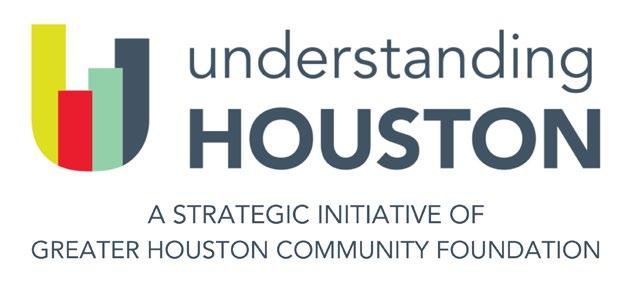
Why do we see such a large aspiration-attainment gap in higher education?
Cost: Price can be a significant deterrent for many people, but scholarships can help alleviate this barrier. A 2025 survey found that for adults without a college degree, better financial support is the top reason they’d consider enrolling. An increase in their personal income was the most cited reason, followed by receiving financial aid or scholarships.
Need for guidance through uncertainty: A study by the Bill & Melinda Gates Foundation found that many students who delay or leave college are unsure of their options, best next steps, and how to navigate the system. Students need social support and capital— mentors, family, or friends who can help them navigate choices and systems.
Undermatching: Undermatching occurs when academically qualified students, often from low-income or underrepresented backgrounds, attend less selective colleges than those for which they are academically eligible. Undermatching can lead these students to become disengaged and underperform if they are unable to fully utilize their abilities or benefit from the resources offered at more rigorous institutions. Information gaps, limited guidance, geographical or psychological barriers, and a misunderstanding about the true cost of selective colleges often cause undermatching.
How Can Scholarships Help?
Scholarships can greatly improve access to higher education and ease the financial burden for many students. Federal Pell Grant recipients, most from households earning under $50,000 a year, face an average $10,000 gap each year between college costs and available aid. Filling that gap can change a student’s path.
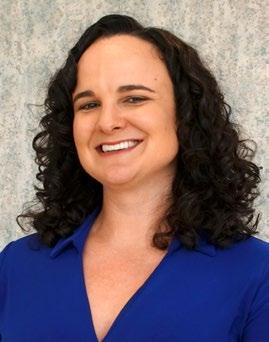
Ready to build brighter futures?
Courtney Grymonprez Scholarships Manager
Making Scholarships More Impactful
At the Community Foundation, we apply proven scholarship strategies to help donors build impactful programs. Our experience with fundholders has revealed the following key practices that drive successful scholarships.
Consider increasing your scholarship award amount. Tuition and other expenses increase on an annual basis. So, small, incremental increases can go a long way each year. Scholarships can be enhanced by increasing award amounts, extending their duration, or by offering more awards.
Update your scoring rubric often. Each applicant possesses different strengths and experiences. Consider offering multiple essay prompts or reworking questions, allowing students to share more about themselves or other responsibilities they have in their personal lives.
Understand your applicant pool. Ensure your ‘big idea’ is relevant or makes sense for the students you aim to serve.
Make your scholarships renewable. A renewable scholarship guarantees students multiple years of funding if they maintain their GPA and enrollment.
Offer scholarship applications in multiple languages. At the Community Foundation, all scholarship fundholders have the option to offer applications in Spanish, making them more accessible to scholarship applicants by allowing students to submit an application in their preferred language. This also allows parents to better support their students throughout the application process.
Allow students to reapply. If making your scholarship renewable is not an option, allowing students to reapply each year can still provide students with the opportunity for multiple years of funding.
At the Community Foundation, we believe in the transformative power of education. Whether you’re passionate about launching a scholarship fund or contributing to our Community Scholarship, your generosity can open doors.
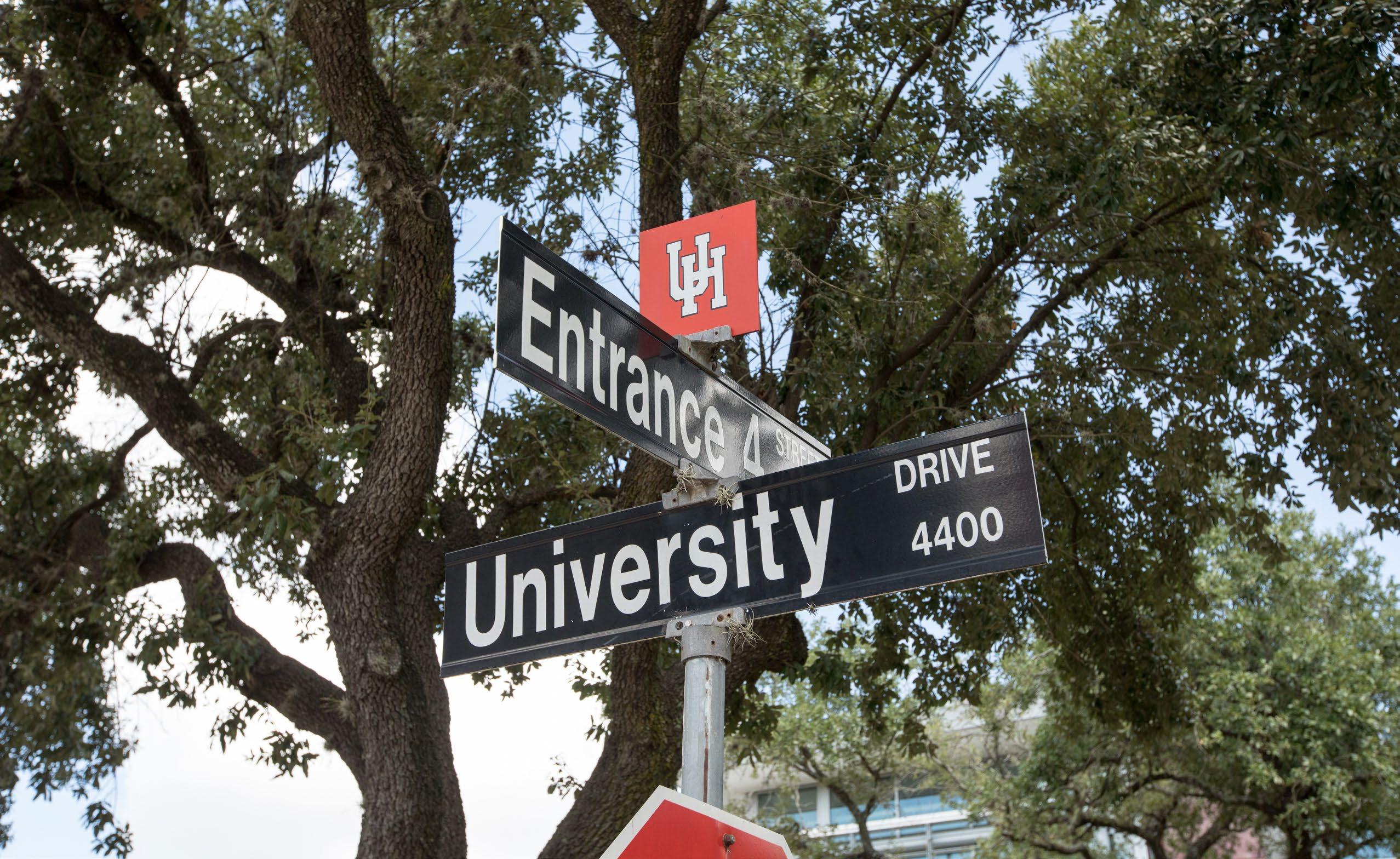
30 Ways We Amplify Giving
At Greater Houston Community Foundation, giving isn’t just what we do—it’s who we are. For over 30 years, we’ve been the “easy button” for philanthropists across Houston and beyond, making generosity simpler, smarter, and more impactful. When you partner with us, you gain access to expert philanthropic advisors who help you build the scaffolding for a lasting legacy, maximize tax benefits, and turn your vision into meaningful action. Whether you’re responding to urgent needs or planning for future generations, we’re here to help you give strategically and with clarity.
How We’re Different
Investment in Houston
Concierge-Level Service
Network of Professional Advisors
Nonprofit Community Knowledge
Strategic Philanthropic Advising
Connection to Top Philanthropists
Educational Opportunities
Multigenerational Planning
Customized Giving

Your Giving, Elevated
Donor Advised Funds
Flexible, strategic giving with expert support and tax advantages.
Designated & Agency Funds
Support specific nonprofits or sustain your own with long-term stability.
Field of Interest Funds
Target causes like mental health, education, or homelessness.
Legacy Funds
Plan for long-term impact across generations and causes.
Scholarship Funds
Open doors for the next generation of leaders.
Supporting Organizations
Create a private foundation alternative with customized governance and support.
Tailored Strategies
Customized Consulting
Tailored to your values, timeline, and charitable goals.
Grants Management
We manage the details—from due diligence to distribution.
Third-Party Investment Management
For funds over $500,000, you can utilize your investment manager.
Values & Legacy Planning
Align your giving with what matters most and create a lasting impact for future generations.
Corporate Philanthropy
We build philanthropy programs that align with company values and address community needs.
Discover how we’ve helped donors amplify their giving—30 ways and counting. Giving for Generations
Center for Family Philanthropy
Your home base for family-focused resources, learning opportunities, and personalized support.
Multigenerational Planning
Engage your family in creating a legacy of generosity.
Next Gen Donor Institute
Education and connection for emerging philanthropic leaders.
Organizing Family Meetings
Facilitate conversations that guide families in aligning values, visions, and philanthropic goals.
Youth Programming & Family Giving Circle
Hands-on opportunities for youth to learn, lead, and participate in giving.
Data-Driven Impact
Understanding Houston
Supporting data-driven philanthropy and action through credible data and insights.
Landscape & Issue Analysis
Data-backed overviews to guide meaningful decisions.
Nonprofit Research
We assess organizations and connect you with partners that align with your values.
Topical Convenings & Events
Join conversations that shape philanthropic thinking and action.
Empowering Communities
Community Impact Fund
A catalytic force for philanthropic impact—making a meaningful difference through data, collaboration, and lasting impact.
Greater Houston Disaster Alliance
Strengthening year-round disaster preparedness and resiliency.
High-Impact Grantmaking
Drives innovative, communityfocused solutions to Houston’s greatest needs.
Giving Circles & Donor Working Groups
Join others to learn and invest together.
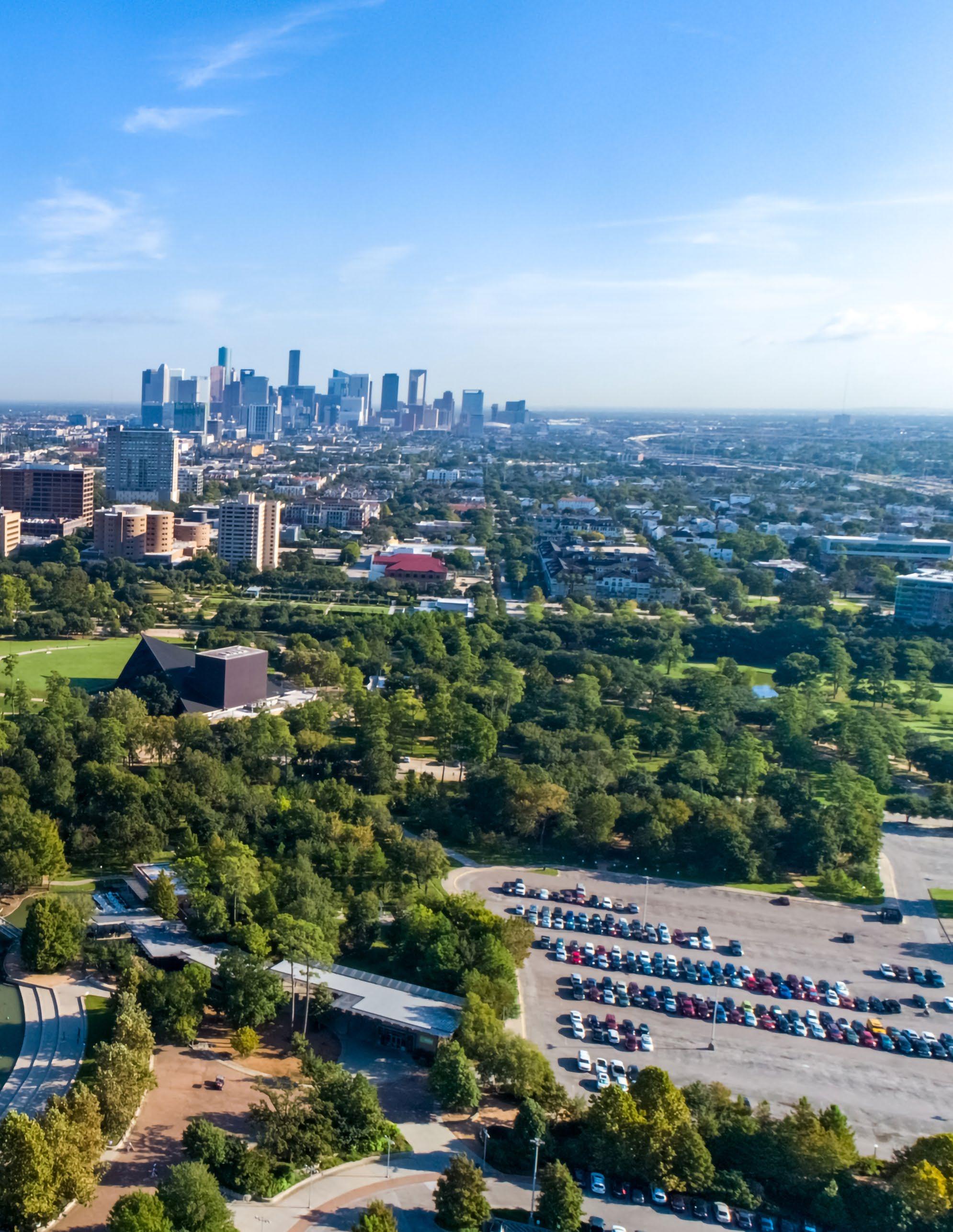
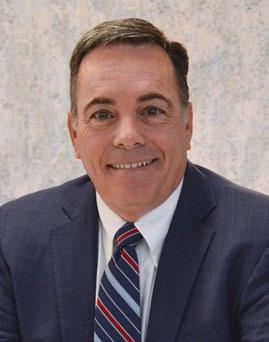
Together, we can create meaningful change in Houston and beyond. Ready to get started?
Kevin Pickett Chief Advancement Officer
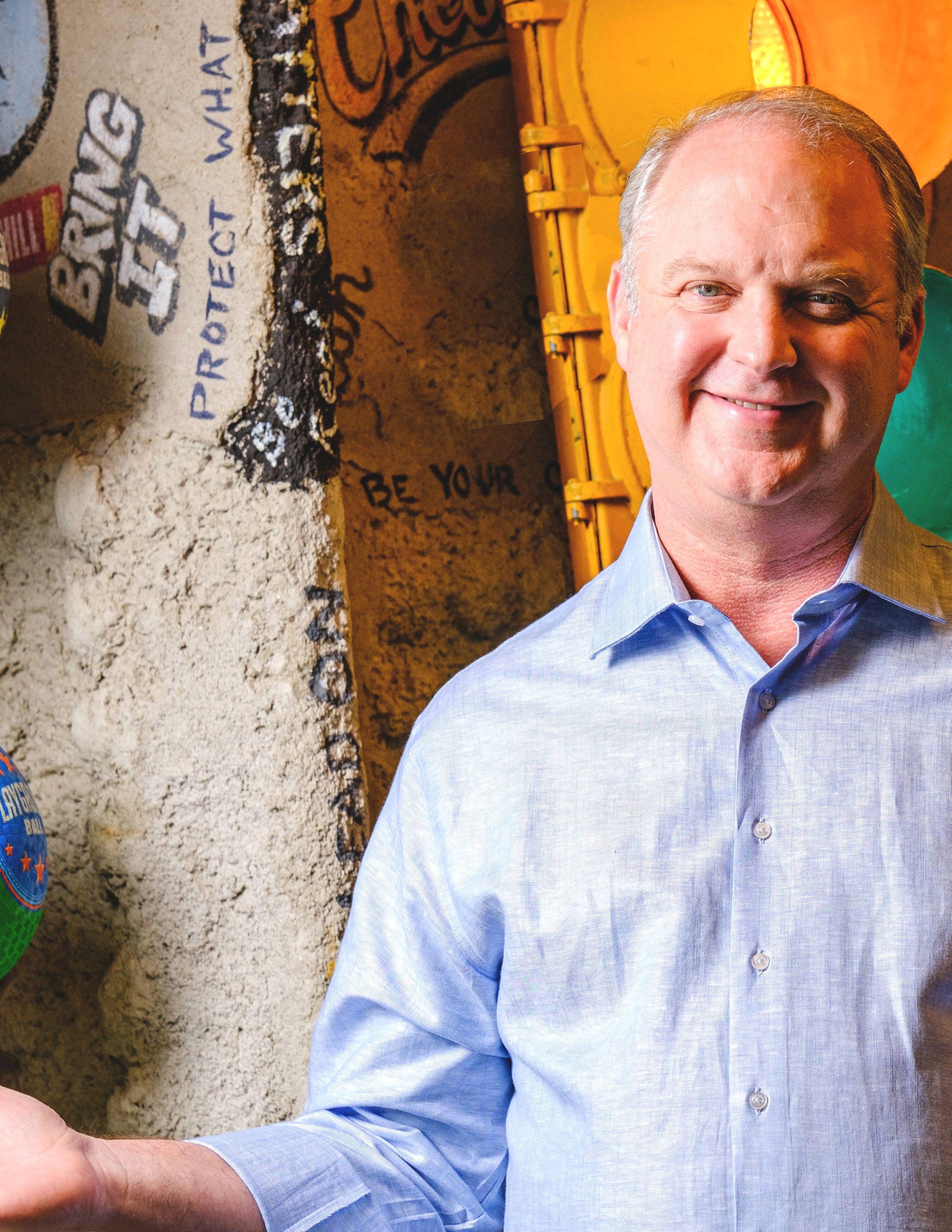
Challenging the Ordinary Brad’s Entrepreneurial Approach for Impact
Brad Deutser doesn’t keep score the way most do. Walk into his office at Deutser, his consulting firm that designs people-focused change solutions, and you’ll see a scoreboard—not one tallying achievements, but a reminder to keep score of something else: impact. “The scoreboard highlights the importance of knowing what to actually keep score of—in life and business, and it’s a reminder to my team and our clients that no one else can determine what is most important to you.” Brad continued, “For my scoreboard, it’s about helping others, giving back, or doing the right thing for someone else. I try to keep score on how I show up to help and serve others.” This perspective is emblematic of the way Brad lives—creating ripples of change to spark exponential impact.
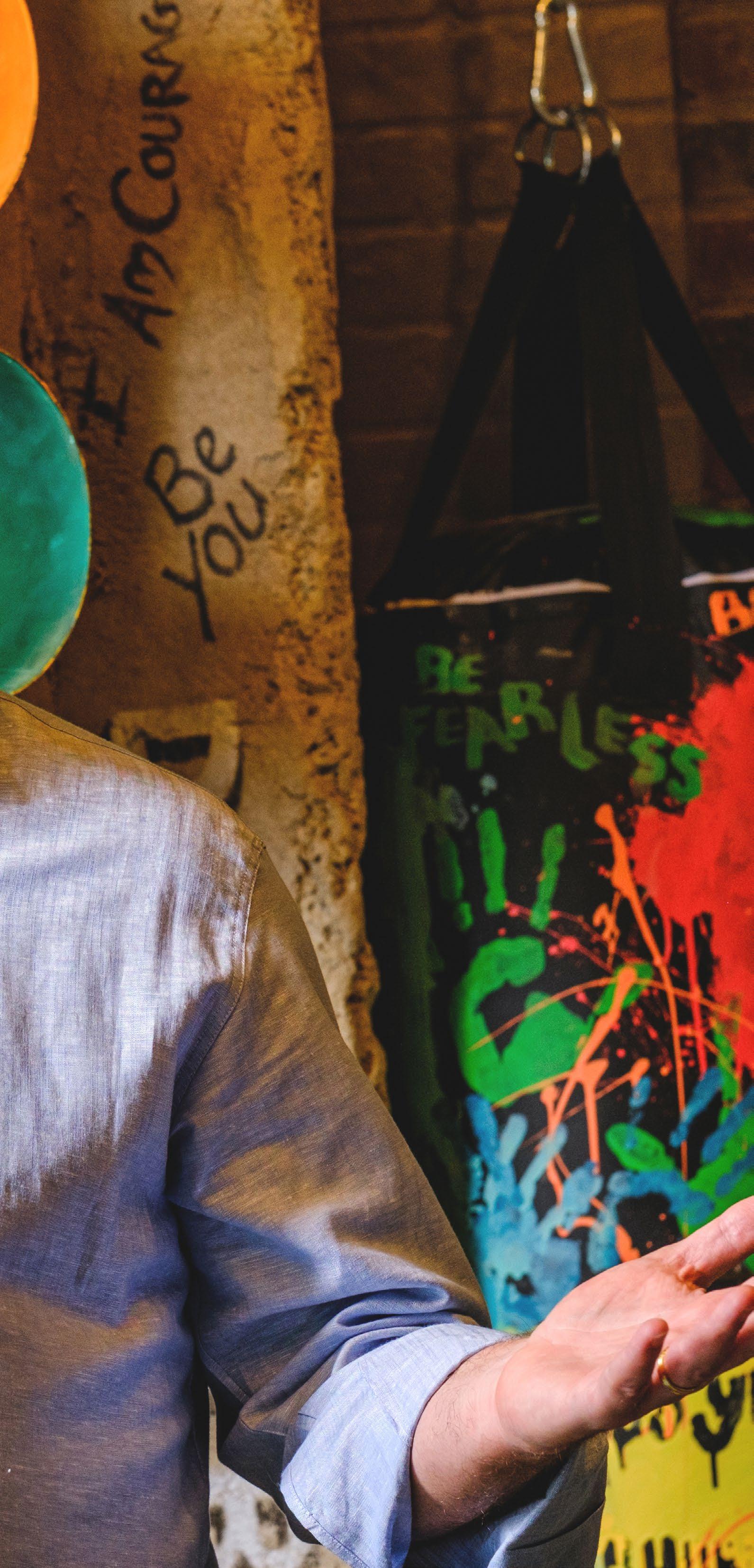
Fueled by Gratitude
Brad’s philanthropic journey started at a young age. He remembers vividly the sense of pride he felt when his parents hosted a gala, with then Vice President George H. W. Bush as the honoree. “It wasn’t about the attention or recognition my parents got from their work,” Brad reflects. “It was about being part of something that mattered. Watching my family lead and give with heart—that’s what shaped me to my core. I will never forget the feeling of that night.”
At the heart of Brad’s approach to philanthropy and leadership is a deep sense of gratitude. He wakes up daily with what he calls a “full cup”—a metaphor for the kindness and support he receives from those around him. Brad feels fortunate to have several influences that showed him how to truly be there for others, “It was my parents, grandparents, my wife, Jill, and her family—but it was also Cyvia and Melvyn Wolff who first brought me in to the Cyvia and Melvyn Wolff Family Foundation, which I now lead and work to ensure its impact for generations to come.” He continued, “Melvyn was everything to me—personally and in business. But it’s Cyvia who challenges me in the most wonderful and profound ways. She is a visionary, seeing what others never dream, inspiring me to keep challenging, learning, and giving.”
Additionally, Brad credits Bert Margolis, the director of Camp Greylock, the camp that Brad attended for 15 years. “Bert showed me how to be vulnerable and to help those who have fallen down around me,” Brad expressed. “Without these people, I wouldn’t be where I am today. Some of my main influencers had a lot to give, some had little to give, but they all had something to give of themselves.” Brad acknowledged his fortunate position, fueling him to help others.
Shaping the Future
In 2011, Brad and Jill opened a donor advised fund at the Community Foundation. They were first introduced to the Community Foundation through Jill’s mother, Frann Gordon Lichtenstein, a longtime fundholder. He shared how it wasn’t until later that he fully understood the impact the fund could have on their giving and their company. Jill and Brad’s legacy of giving permeates to their children, Ashley and Andrew. Brad beams when talking about the way his family has engaged with the Community Foundation. “From as early as our kids can remember, they were part of a philanthropic environment. As a family, we would fundraise for the Juvenile Diabetes Research Foundation with our Deutsers Defeating Diabetes team.” He recalls when Andrew set up a lemonade stand and took the proceeds to a school in Gulfton, handing out five-dollar bills to each student, saying, “I want to show you that I believe in you because someone did this for me, and I want to pass it forward.” For Brad, that moment said it all. As his children grew older, Brad shared that the Community Foundation became an integral part of their lives. Both of his children participated in the Community Foundation’s Family Giving Circle (Giving Circle), a learning opportunity
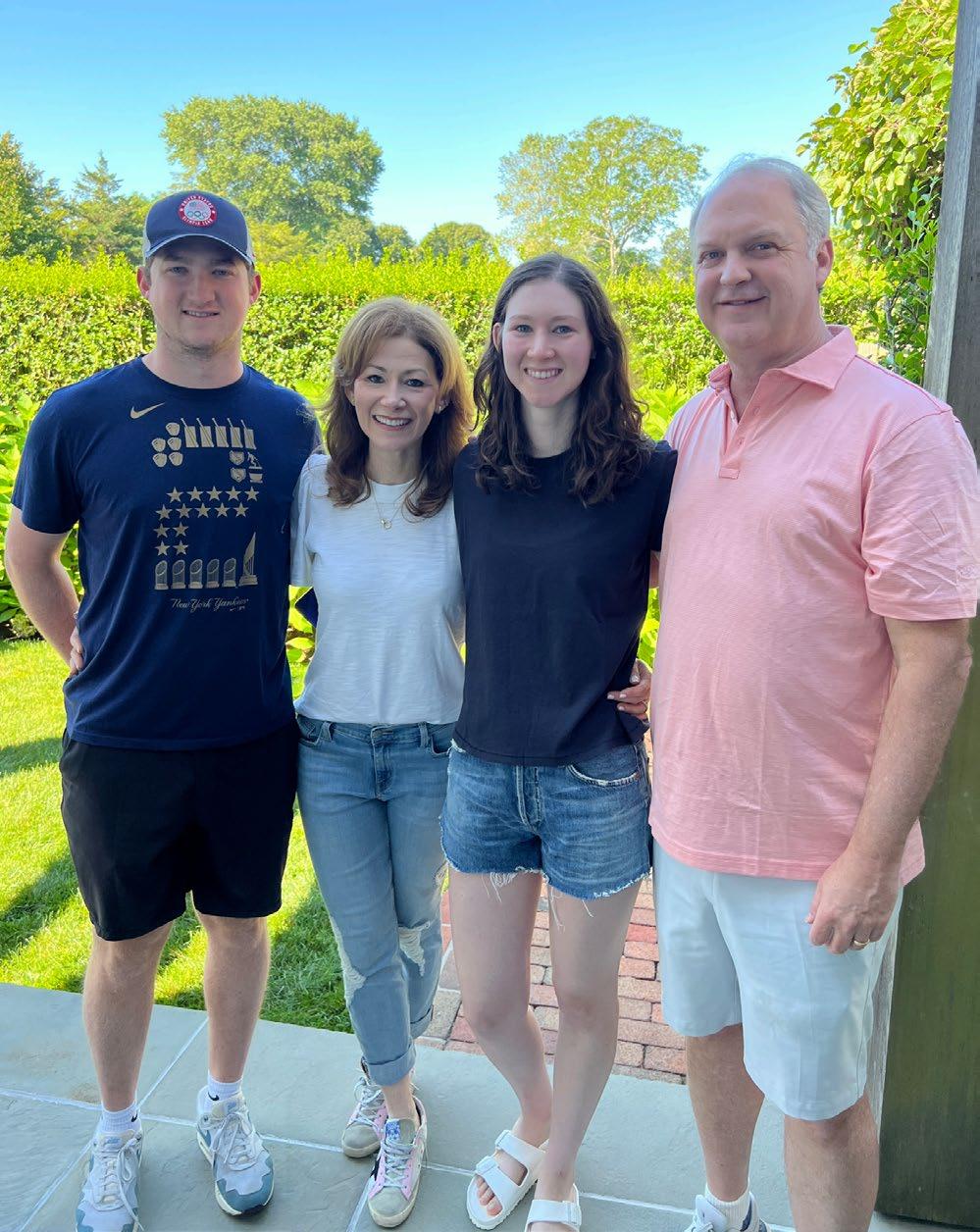
for 7th- to 12th-grade students to learn, volunteer, and grant together in Greater Houston. This network of students learns about the nonprofit landscape and how to be a thoughtful and strategic grantmaker. Brad knows his children developed clarity on their values, independent thinking, community knowledge, and leadership skills after completing the program. As a parent, it was thrilling for him to watch his kids participate on their own as they entered their teenage years.
Through the Giving Circle, Ashley was introduced to the realities of food insecurity in Houston. One evening Ashley shared about the three different nonprofit grant finalists of the Giving Circle—all doing incredible work. When Brad asked if they would support all three, Ashley responded: “No! Because if we give to all three, we lose impact. Two are giving food away. The other is changing behavior, and we are focused on long-term solutions to help address the root causes of hunger.” Brad was floored. “As a young kid, she had a framework for evaluating nonprofits,” he says proudly. “She had learned how to think critically about real issues—and to talk about them. Later, Ashley penned an editorial about the impact of her generation on philanthropy for the Houston Chronicle. That impact was driven by the Community Foundation.”
Challenging the Status Quo
Brad’s belief in people-powered change and giving back is fundamental to his business. He’s known for asking challenging questions that go deeper than surface-level answers. “I challenge everything. I ask raw questions to challenge people and systems to think differently. I look at challenge as the greatest creative force multiplier in an organization and a powerful tool for good.” Through questioning nonprofit leaders, he gains a deeper understanding of the real underlying issues and creates ways to boost their impact. It also gives the nonprofits a framework to ensure their funding request most effectively meets their objectives.
Brad approaches philanthropy with an entrepreneurial mindset, always seeking better ways to give. “Just because it’s been given in a certain way before, doesn’t mean it is the best way going forward,” he says. As President of the Cyvia and Melvyn Wolff Family Foundation, Brad partners with the Community Foundation for professional, philanthropic advisory, and administrative services. “What attracts me most to the Community Foundation is its people, professionalism, and expertise. The Community Foundation’s staff are the experts—they go deeper than I ever dream about going with their breadth of understand-
L-R: Andrew, Jill, Ashley, and Brad Deutser
ing on giving trends, which educates and influences the way my family, the Wolff Family Foundation, and my company gives.” Insights from the Community Foundation often influence his work with clients across the country. “It’s not just about their dollars—it’s about their dreams, their legacy, their opportunity to uplift others now and for generations to come.” Through this lens, Brad helps people go deeper to create real, lasting change.
In 2015, Deutser established the Deutser Clarity Fund at the Community Foundation. This fund enables his company and his team to support organizations across the community in unique ways. Brad recalled a conversation with Steve Maislin, President and CEO of the Community Foundation, about a company that had opened donor advised funds for every employee, and the idea stuck with him. “It was brilliant, and I became obsessed, so we did it.” Every employee at Deutser has a personal giving fund, also known as an Employee Donor Advised Fund. “It’s become a critical part of who we are,” Brad says. “Our team talks about what they’re supporting, what they care about. It connects them to their communities—and each other.” Brad cited how a company’s giving culture is such a unique benefit. “Our people love it, and it’s an incredible differentiator,” he adds. Philanthropy fuels Brad to transform and shape his company’s culture. “People want to give back— sometimes they just don’t know how. When we created individual employee funds, we gave them a pathway to give and an expectation that giving is part of who we are and how we serve.”
Beyond the Score
Brad’s mission is succinct: to light up the scoreboard with meaningful, positive change. “If you’re keeping score,” he says, “Make sure it’s for the right things. Not the accolades, but the times you showed up. The moments you made someone else feel seen, empowered, or hopeful. The time you were quietly there to help lift someone else up or envision a different future.”

Ready to spark impact?
Jennifer Touchet Vice President of Personal & Family Philanthropy
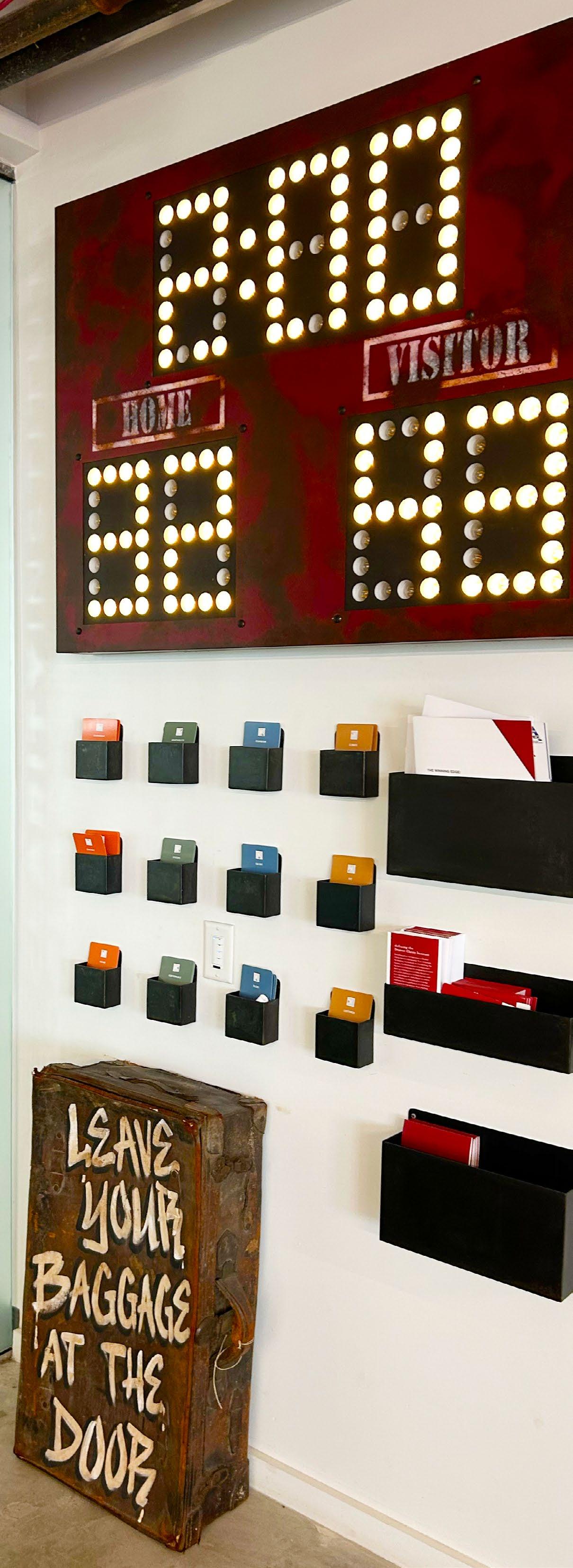
Powering Resilience
Solar Batteries Helping Houston’s Most Vulnerable Communities
Houstonians are no strangers to power outages caused by extreme weather. From Winter Storm Uri in 2021 to the recent impact of Hurricane Beryl, our region has experienced firsthand the critical importance of access to electricity during a crisis. While some residents have the means to prepare for and recover from a disaster, low-income communities often lack access to affordable and practical options. As a result, they tend to experience more severe impacts from disasters and longer, often incomplete, recoveries.
That’s where Greater Houston Disaster Alliance steps in, working year-round to help build resilience and reduce harm caused by disasters to our most vulnerable residents.
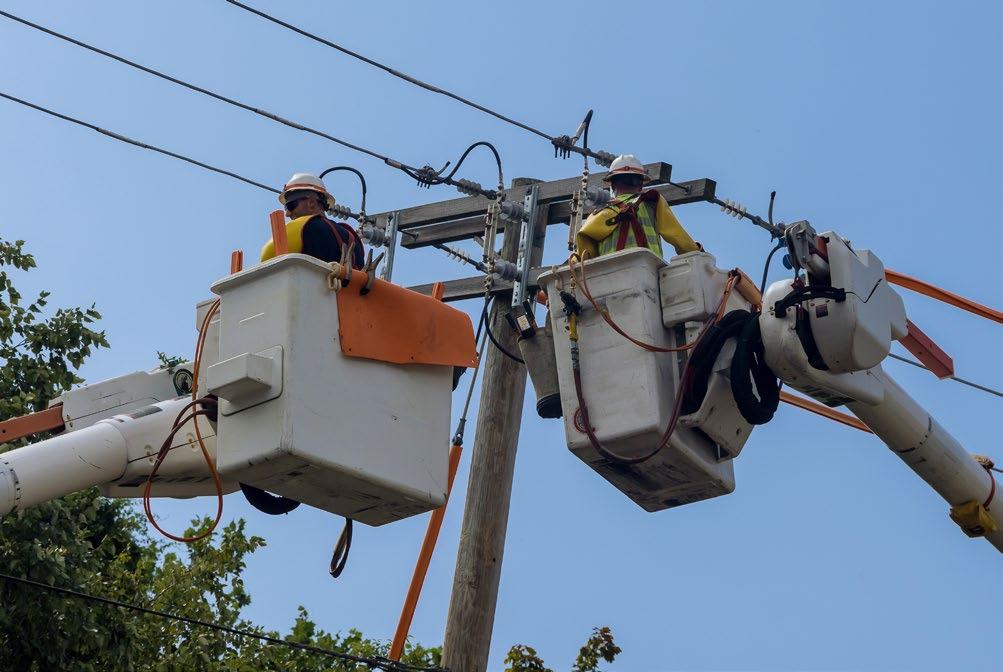
What is the Disaster Alliance?
In 2023, Greater Houston Community Foundation and United Way of Greater Houston formally established a philanthropic partnership, Greater Houston Disaster Alliance (Disaster Alliance), to accelerate recovery in times of disaster. With over 35 years of combined experience in disaster response, the Disaster Alliance aims to lead the philanthropic recovery effort, bolster year-round preparedness, and ensure that our region has the networks and systems in place to respond rapidly and effectively in times of disaster.
Building Resiliency
One promising innovation that emerged before the formal launch of the Disaster Alliance was the establishment of solar-powered battery lending libraries. This early pilot initiative helped the Community Foundation and United Way understand how to grow their partnership in building resiliency. The initiative explored lending small solar-powered batteries that can power a variety of small appliances, such as cell phones, fans, and lamps, for several hours without needing to be recharged. Depending on usage, a fully charged battery can operate for up to 45 hours, which can be lifesaving, especially for medically fragile residents in a crisis. The batteries can be recharged with solar panels to ensure continued use of critical appliances.
In 2021, Powered for Good, developed by Houston Advanced Research Center (HARC), was launched as a pilot initiative to test the potential of battery lending libraries in Harris County. Powered for Good created a system to distribute solar-powered Generark Home Power batteries through trusted community-based organizations. HARC tested the batteries and developed training materials to ensure residents could use, maintain, and store them safely. HARC connected with the Community Foundation and United Way to identify nonprofits with deep community connections and solid plans for distributing these batteries during widespread power outages, and they also serve individuals on a case-by-case basis to ensure those most in need receive support.
The first phase of the pilot was funded through the Winter Storm Recovery Fund and distributed 65 batteries to The Women’s Home and 35 batteries to West Street Recovery With the success of the initial program and growing demand, an additional 250 batteries were allocated in 2024—45 more to The Women’s Home, 200 more to West Street Recovery, and five to the Houston Community ToolBank. Alice Liu, Co-Director of Communications, Organizing, and Disaster Preparedness at West Street Recovery, added, “These batteries foster both physical and psychological resilience. Community members with a battery feel—and are—more prepared ahead of storms. When severe weather is in the forecast, residents know to recharge their batteries to full and ensure everything is functioning. The batteries can be recharged via a wall outlet, in a car, or with the solar panel, giving residents multiple backup options and a greater sense of independence and security during emergencies. Having a battery allows residents to keep their communication devices charged, to power essential medical devices, and run select household appliances.”
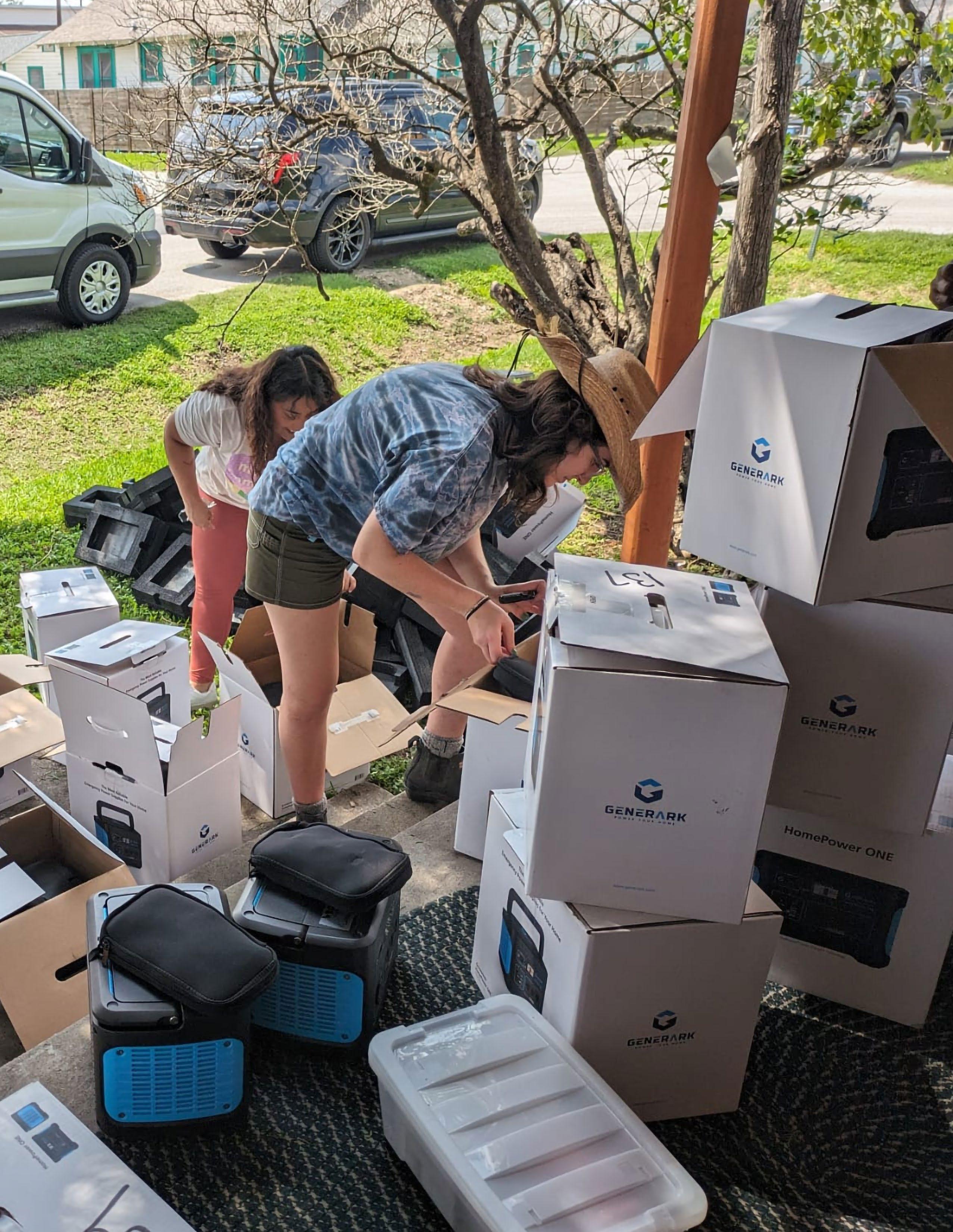
West Street Recovery inventoried and distributed solar batteries to more than 200 Fifth Ward Residents who were among the nearly one million Houstonians left without power for a week following the May 2024 Derecho disaster.
Meet the Frontline Partners
Houston Community ToolBank is an equipment, tool, and resource lending library for community-based organizations in our region. The ToolBank aims to build capacity in the nonprofit sector by reducing resource-related costs so nonprofits can direct their funding toward mission-focused activities and not toward renting equipment. Over the years, the ToolBank has grown significantly in response to disasters encouraging nonprofits to “check out” their equipment ahead of severe weather.
The Women’s Home strengthens women and supports families as they reclaim their stability, with permanent housing sites across Houston. It has strong relationships with residents, creating a client base that can access batteries when needed—whether during storms or when unable to pay their electric bills—ensuring energy access for those who need it most.
West Street Recovery is a community resilience organization that aims to help neighbors rebuild stronger in the aftermath of disasters. Their innovative “Hub House” model transforms neighborhood homes into community distribution centers, providing emergency resources and evacuation assistance during disasters or power outages. Each Hub House is led by a resident ‘block captain,’ who coordinates communications, manages the distribution of emergency resources, and is positioned to deploy solar batteries swiftly to neighbors with urgent needs.
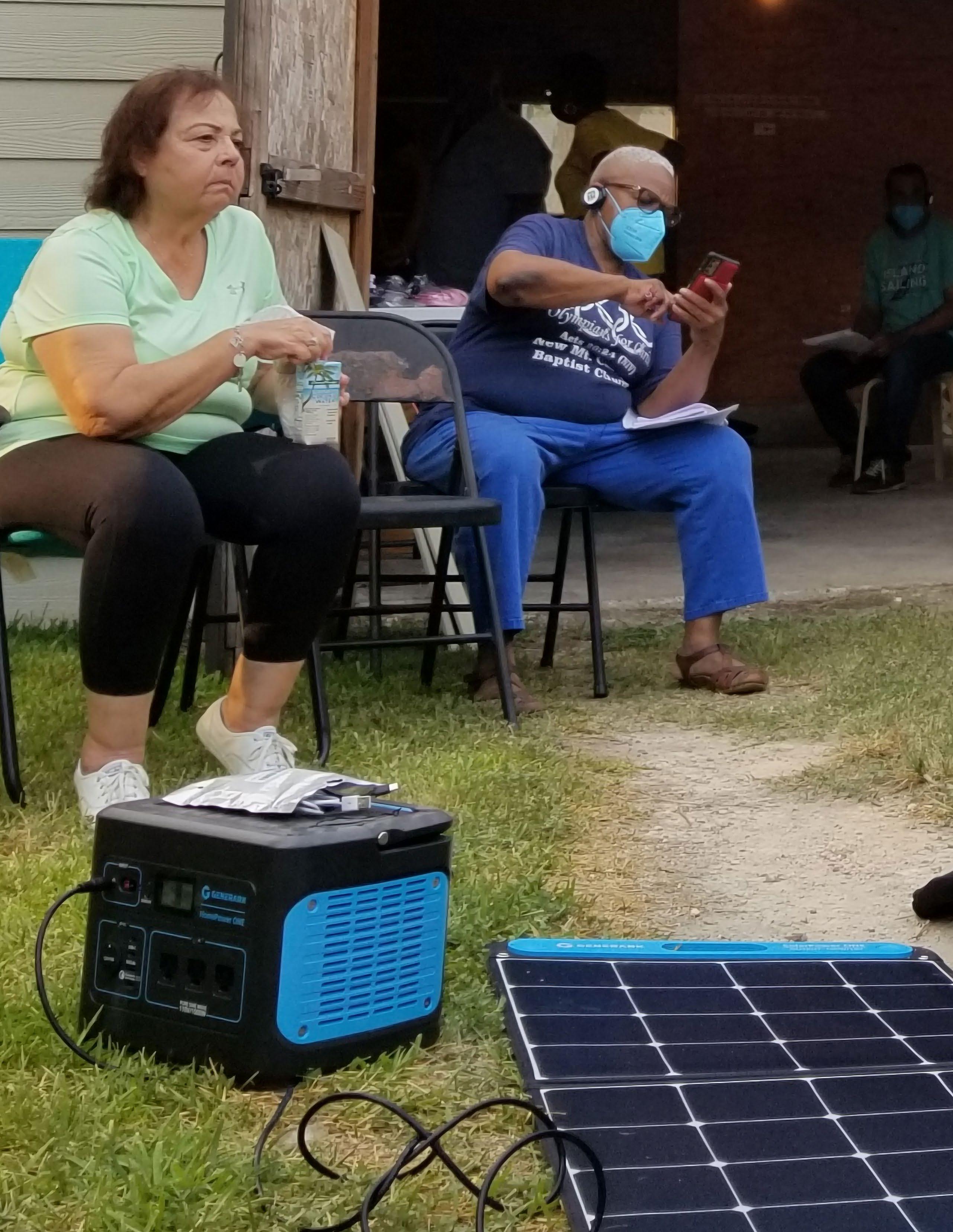
Alice Liu also shared, “In the aftermath of a disaster, mobility and transportation can limit the ability to distribute supplies. To counteract this, we try to stage the batteries year-round as close to where they will be needed as possible.” At West Street Recovery, priority for distributing hub batteries goes to households with children under four, a member who relies on medical equipment, or a member over 65, ensuring that their more vulnerable neighbors receive support first. West Street Recovery also encourages community members to lend their batteries to neighbors, friends, or family members who have not had their power restored, as different streets may get power back at various times.
The Women’s Home and West Street Recovery operate the program through a trust-based model, with deep knowledge of who their most vulnerable neighbors are and how to quickly get them the right resources. Bethany Fields, Vice President of Grants and Evaluation at The Women’s Home, shared, “Our trust-based approach centers the dignity, voice, and lived experience of each resident. When deploying batteries through the Powered for Good initiative, we prioritize listening over prescribing. Rather than making assumptions about need, we engage residents directly in conversations about how backup power can support their safety, independence, and well-being.” Because the battery lending system operates outside of traditional disaster response timelines, it supports ongoing resilience, not just emergency relief.
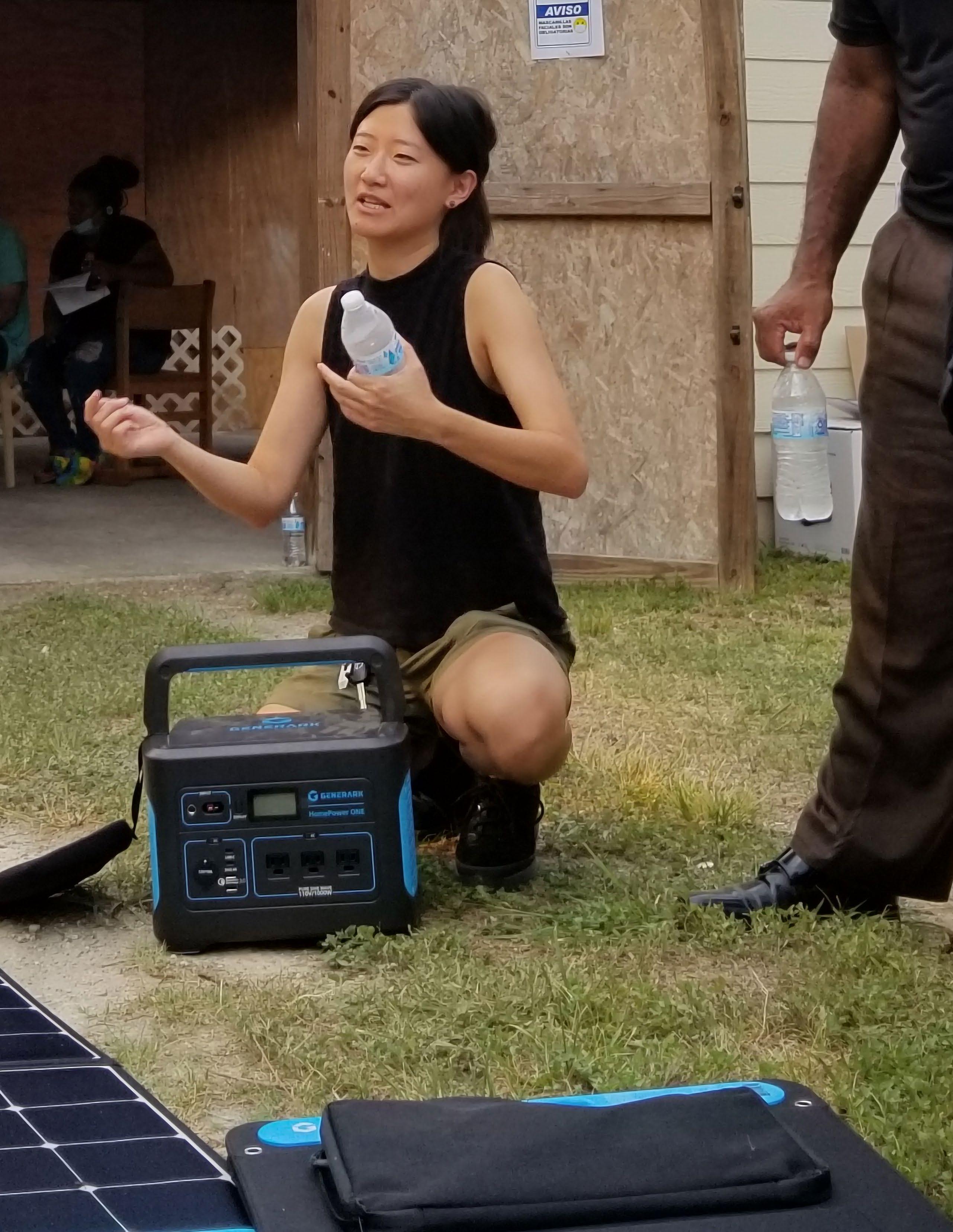
Turn up your volume. Leave a louder impact.
Experience the power of amplified giving. Greater Houston Community Foundation is your “easy button” for high-impact philanthropy.



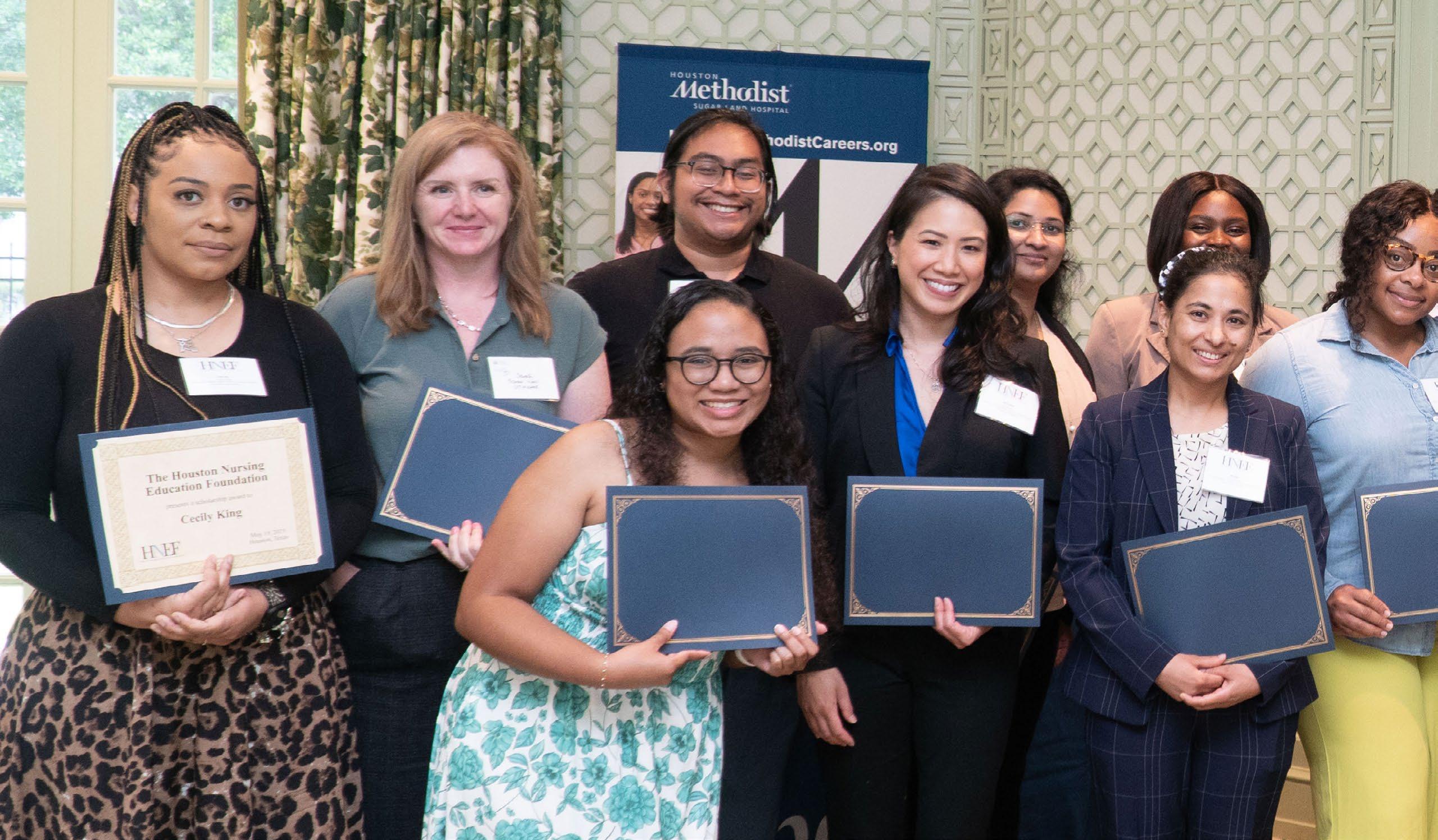
Amplifying Impact, One Nurse at
a Time
Houston Nursing Education Foundation
In response to the growing nursing shortage, the Houston Nursing Education Foundation (HNEF) is sharpening its focus—channeling all resources into scholarships that empower the next generation of nurses.
For decades, HNEF has helped to advance healthcare throughout Greater Houston, investing over $6 million toward initiatives that enhance healthcare delivery in Houston. Now, with Houston as the home to the world’s largest medical complex, the Texas Medical Center, HNEF is doubling down on removing financial barriers and helping more nursing students reach the front lines of care.
Nursing in Crisis
The nursing shortage impacts hospitals, schools, and communities nationwide. The National Center for Health Workforce Analysis estimates that by 2030, the shortfall of registered nurses will exceed 500,000. The report notes how the COVID-19 pandemic impacted the population seeking care, the workforce providing care, and the data available for both. This gap is felt across the entire healthcare spectrum, as a shortage of nurses means a shortage of care for everyone.
A Strategic Pivot
Now, HNEF is amplifying its impact by focusing exclusively on supporting nursing education scholarships—fueling dreams, breaking down barriers, and building a stronger, more resilient healthcare workforce. Since partnering with the Community Foundation in 2017, HNEF has awarded over $2.4 million in scholarships to 295 nursing students. With their new strategy in place, for the 2025-26 academic year, HNEF will award more than $700,000 to 79 new scholarship recipients, and 40 renewing scholarship recipients.
John Landa, Board President of HNEF, shared, “Imagine you are building a lake. You can create a lake that is a mile wide and one foot deep, or you can design a lake that is a quarter of a mile wide and several feet deep. We decided to build a deeper lake; we decided to have a deeper impact.” This strategic shift is rooted in the belief that the most effective way to combat the nursing shortage is to invest in the next generation of nurses.
Stronger Together
In addition to administering scholarships, HNEF partners with the Community Foundation to provide comprehensive back-office support—managing funds, processing payments, and supporting the preparation and facilitation
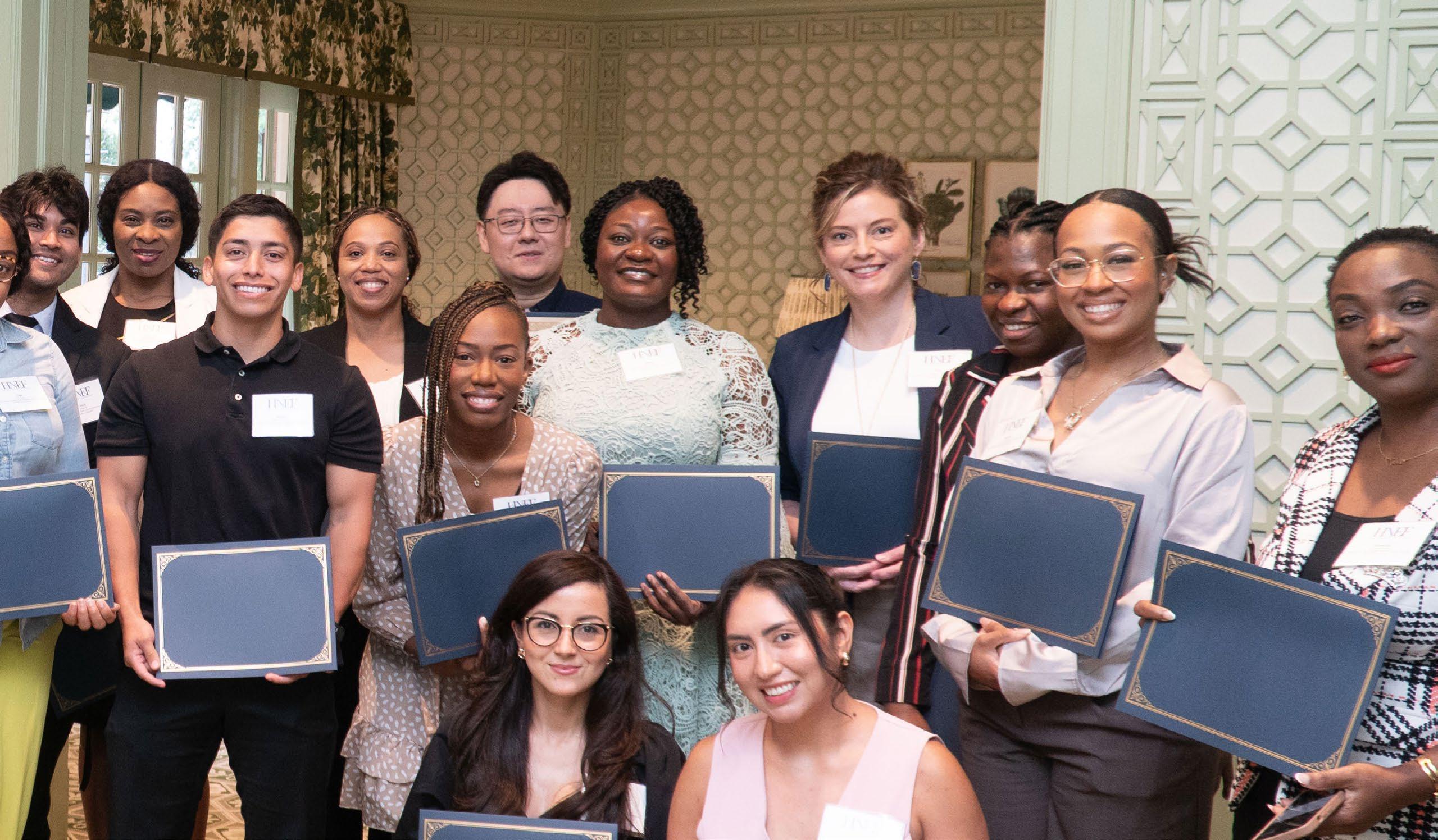
of board meetings. Landa shared, “The Community Foundation is more than just our business office. HNEF does not have any employees, meaning we do not pay salaries, benefits, and so forth. The partnership with the Community Foundation enables us [HNEF] to focus on leading and less on administration while keeping our overhead expenses low.”
Additionally, the Scholarships Team at the Community Foundation provides analytics to HNEF to help shape how it deploys funds. Landa continued, “We rely on the Community Foundation team to provide us with statistics and data analysis to guide our decision-making, sharpening the tools we use to navigate this landscape.”
Launching Futures
If students continue to meet eligibility requirements, HNEF’s scholarship can be renewed through graduation from their nursing program. Landa explained, “A lot of these nursing students have multiple personal obligations. To get these students to enter a nursing program, they’ll have much more confidence if they can count on support that gets them closer to the finish line—graduation.” By reducing financial barriers, HNEF makes nursing degrees more accessible and attainable.
HNEF’s refined focus on scholarships empowers future leaders, strengthens communities, and transforms lives.
Landa stated, “The nursing profession is one of the best and most accessible professions for upward economic mobility. Providing scholarships to nurses gives them access to climb an economic ladder that is so direct and effective—a huge difference-maker in the lives of these students and their families.”
Looking Ahead
Every scholarship awarded by HNEF is an investment in the future of healthcare. As these scholars graduate and enter the workforce, they develop clinical skills and a deep sense of purpose—knowing they were supported by a community that believed in their potential to lead, heal, and make a lasting impact.
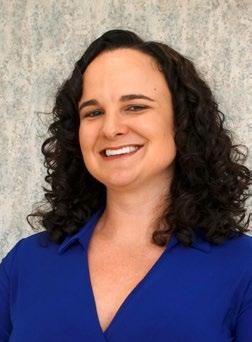
Ready to amplify the power of education?
Courtney Grymonprez Scholarships Manager
Your Giving, Your Way
Charitable Gift Types
Partner with the Community Foundation to unlock the power of charitable giving and explore tailored charitable gift options that align with your personal values and financial objectives.
Business Interests
Donating business interests may qualify you for substantial tax deductions, including income, capital gains, and estate tax benefits.
Cash
A donation by check, wire, or ACH to your donor advised fund is a hassle-free way to contribute to your philanthropic endeavors.
Closely Traded Stock
A strategic and impactful way to support charitable causes while optimizing your financial portfolio.
Coins, Jewelry, & Art
A unique gift that supports charitable causes while offering valuable tax benefits and flexibility in your philanthropy.
Life Insurance
Life insurance policies that have outlasted their original purpose can be made into gifts to the Community Foundation.
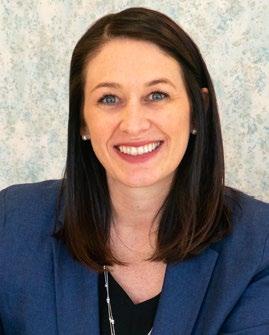
Andrea Mayes Senior Director of Charitable Solutions
Privately Held Assets
Donating privately held assets offers tax benefits, legacy preservation, and flexibility to align with your philanthropic goals and financial needs.
Publicly Traded Stocks, Bonds, & Securities
Leverage appreciated securities, including shares of stock, bonds, mutual funds, or exchange-traded funds, for a tax-smart donation.
Real Estate
Donating appreciated real estate, such as a home, vacation property, undeveloped land, ranch, or commercial property, can make a great contribution to a donor advised fund.
Retirement Assets
Leverage your retirement assets, such as your IRA, 401(k), pension, or other tax-deferred plan, to have an impact while experiencing potential tax benefits.
Don’t just give. Invest in impact.
Find out how your generosity can do more at Greater Houston Community Foundation.


Mark Your Calendar
2025 Year-End Deadlines
GIFT TYPE
Check or Stock Certificate
Special Securities
Mutual Funds
Publicly Traded Securities
Grant Recommendations
Wire Transfer
DEADLINE
Postmarked on or before December 31
December 1
December 1
December 12
December 15
December 31
The IRS requires contributions to be received into the Community Foundation by December 31, 2025, to receive a 2025 deduction. Please contact donorservices@ghcf.org to ensure your intended gift is properly credited.
Scan the QR code for gift submission instructions!
Greater Houston Community Foundation does not provide tax advice or services. Please consult your personal advisor with questions regarding your tax planning.
Upcoming Programs
Intentional & Multigenerational Giving
THURSDAY, SEPTEMBER 11
Community Foundation Office
Community Foundation partners and fundholders are invited to join us for tailored discussions and interactive exercises designed to help you align your family’s values with your philanthropic goals to create a lasting charitable legacy.
Quarterly
Volunteer Day
SATURDAY, SEPTEMBER 13
Sandal Gap Studio
Community Foundation partners and fundholders with children ages five and older are invited to join us for age-appropriate activities that foster generosity, encourage teamwork, and celebrate our three decades of giving back to the community.
Professional Advisor Breakfast
THURSDAY, OCTOBER 23
The Briar Club
Professional advisors are invited to join us for an engaging session designed to help them gain practical insights and resources to guide their clients in building intentional, lasting philanthropic legacies.
Family Philanthropy Day
SATURDAY, NOVEMBER 8
The Health Museum
Community Foundation partners and fundholders are invited to join us for our 10th Annual Family Philanthropy Day—a half-day, multigenerational volunteer event for families with children ages five and older to learn, serve, and give back together as we celebrate our 30th anniversary.
If you are interested in attending one of our programs, please contact events@ghcf.org.
Community Foundation Leadership
2025 Governing Board
CHAIR
Bob Harvey, Retired, Greater Houston Partnership
Gregory L. Ebel President & CEO Enbridge Inc.
Kate Fowler Executive Director Jerry C. Dearing Family Foundation
Kelly Hackett Managing Director Family Office Services Tectonic Advisors
Philip J. Hawk Retired Executive
Douglas C. Kelly President Hilcorp Ventures, Inc.
Cody McGregor* Managing Director FTI Consulting
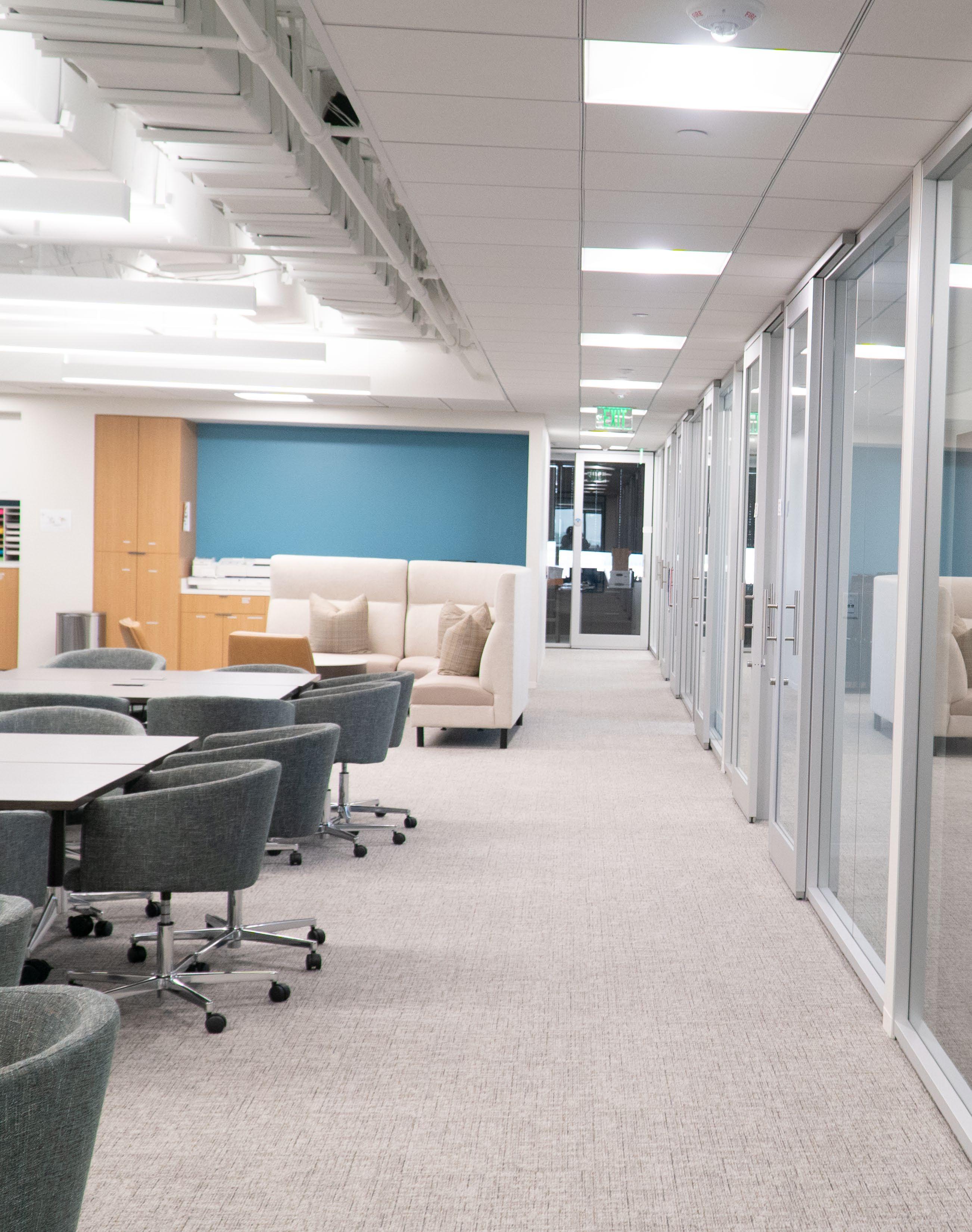
IMMEDIATE PAST CHAIR
Chris Weekley, President, David Weekley Homes
Cullen Geiselman Muse, Ph.D. Chair of the Board Cullen Trust for Health Care
Avani Narang*
Managing Director of Marketing & Digital Communications Indus Communities
Brandon Simmons Chairman of the Board of Regents Texas Southern University
Jay Sears Co-Founder & Managing Partner NewQuest
Jay Steinfeld Founder & CEO Blinds.com
Y. Ping Sun Of Counsel Yetter Coleman LLP
Executive Leadership Team
Stephen D. Maislin President & CEO
Pooja Amin General Counsel
Rebecca Hove
Managing Director of Strategic Philanthropy
Mike Pawson Chief Financial Officer
Kevin Pickett Chief Advancement Officer
Jennifer Touchet Vice President of Personal & Family Philanthropy
Diana Zarzuelo Vice President of Community Impact
Caren Sweetland Attorney
Tym Tombar Managing Director Arcadius Capital Partners
Anthanette (Toni) Wilson Attorney Community Leader
Enoch Woodhouse Chief Executive Officer Smith Family Circle
Thomas Wright Thomas M. Wright Advisory LLC
*Next Gen Representative
Impact in Action Magazine Team
Kassidy Daussin Graphic Designer Marketing Creative Associate
Kaitlin Necas Copywriter Communications Specialist
Rachel Young Copy Editor Director of Marketing & Communications
